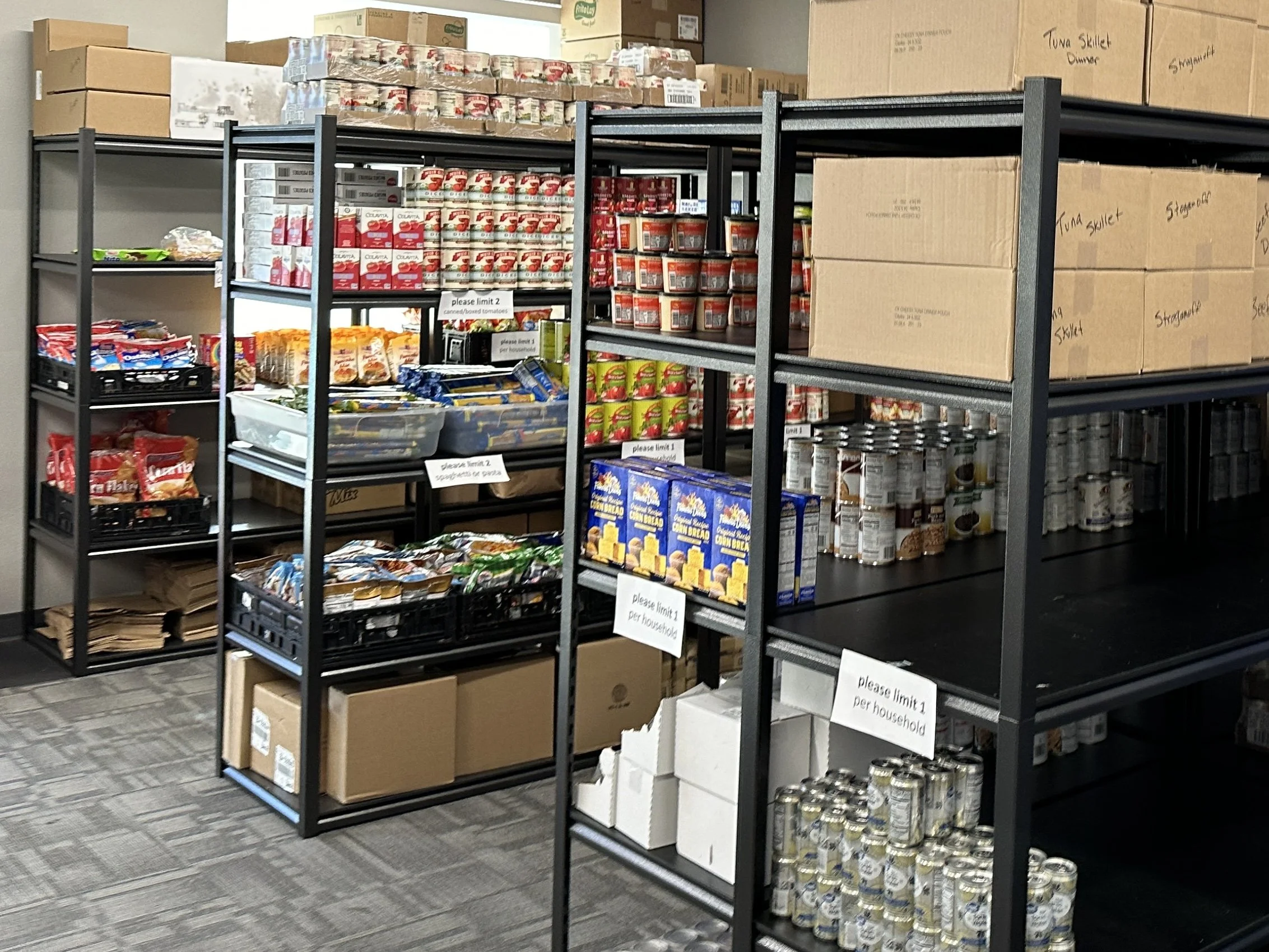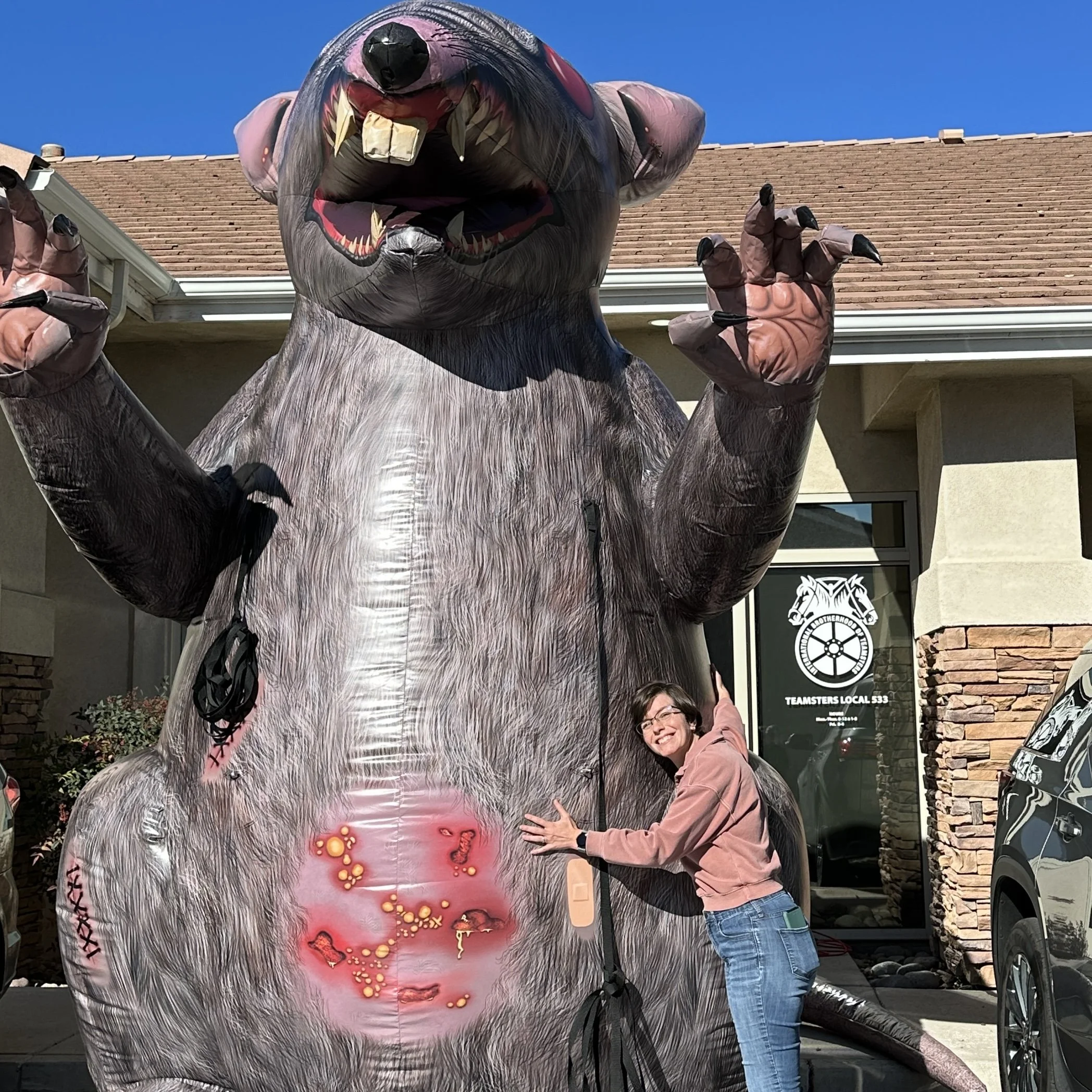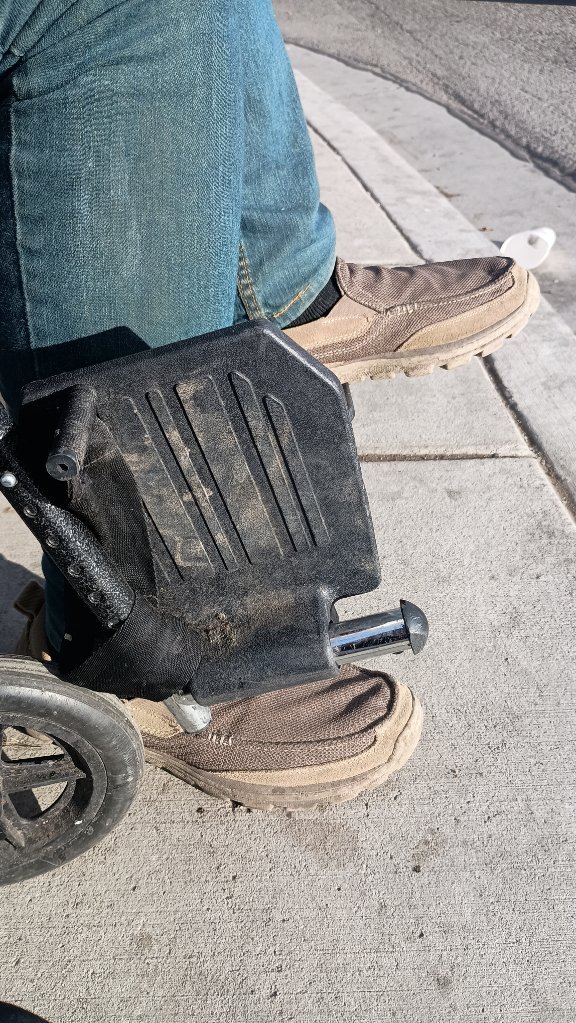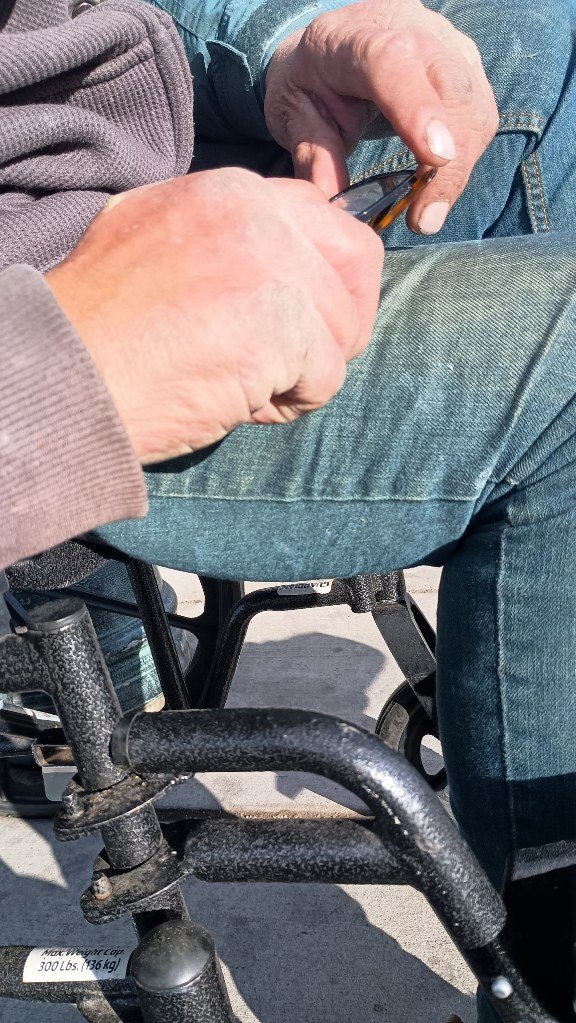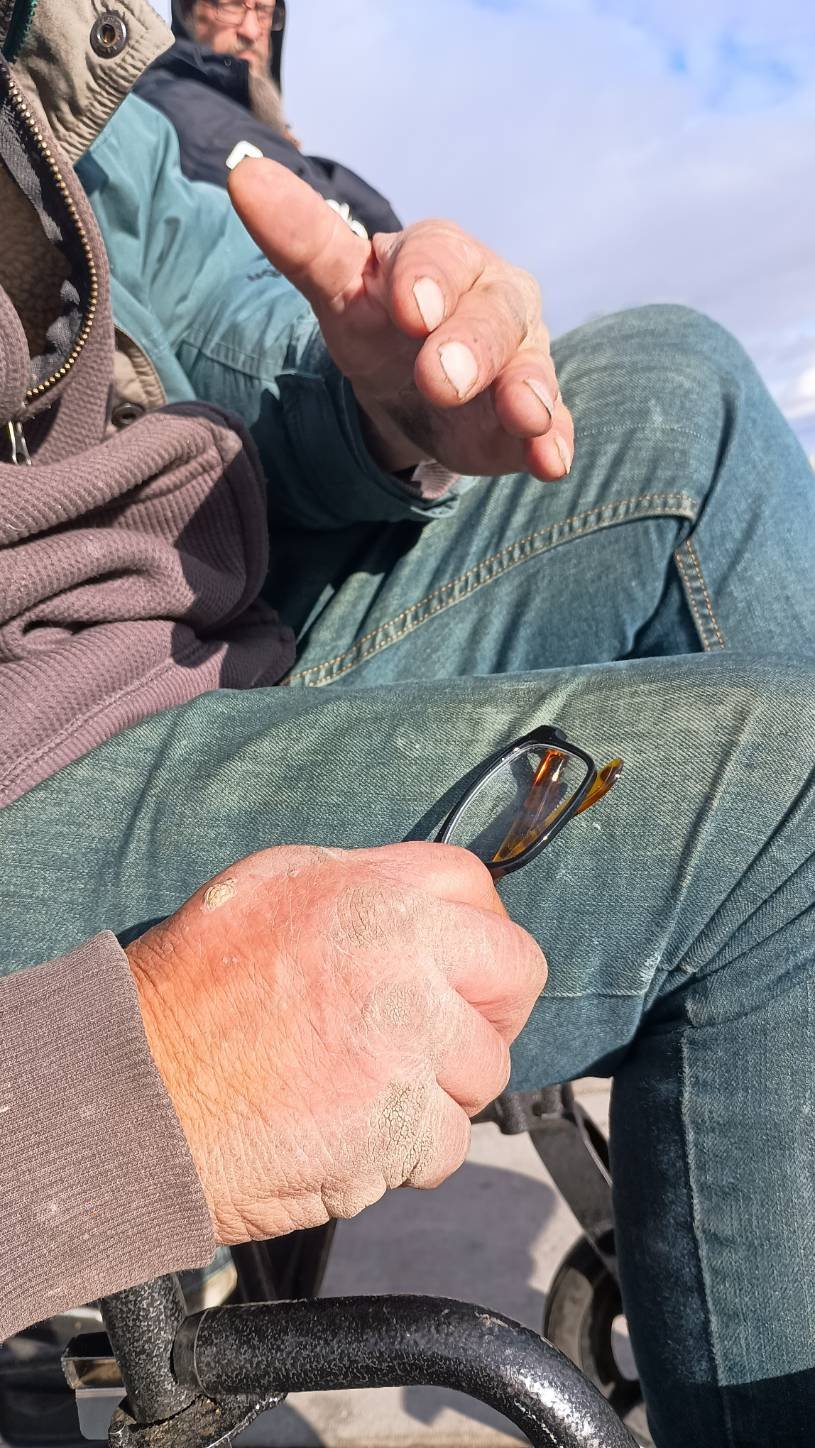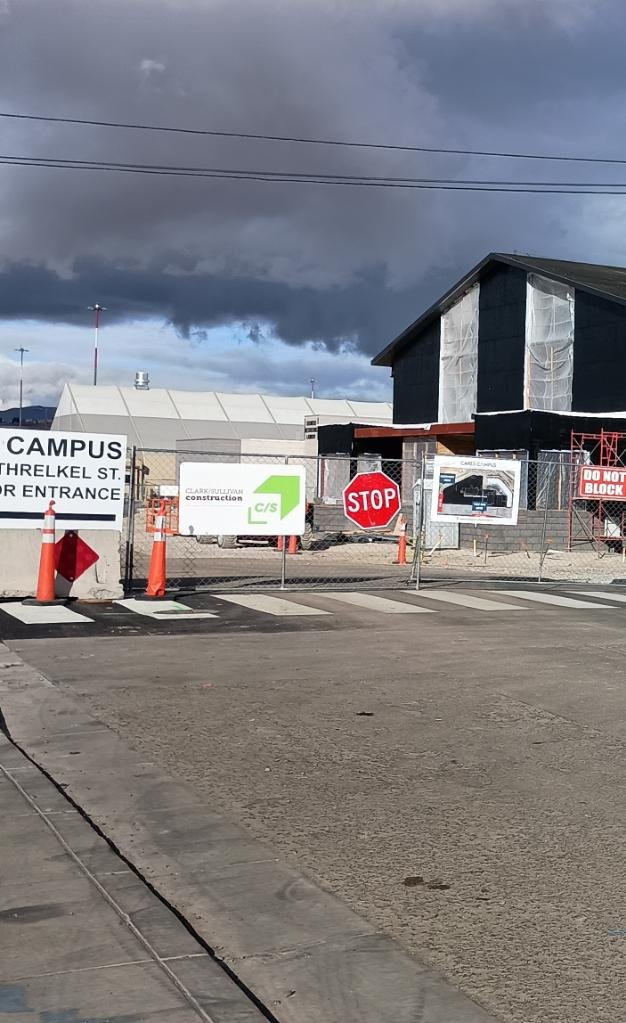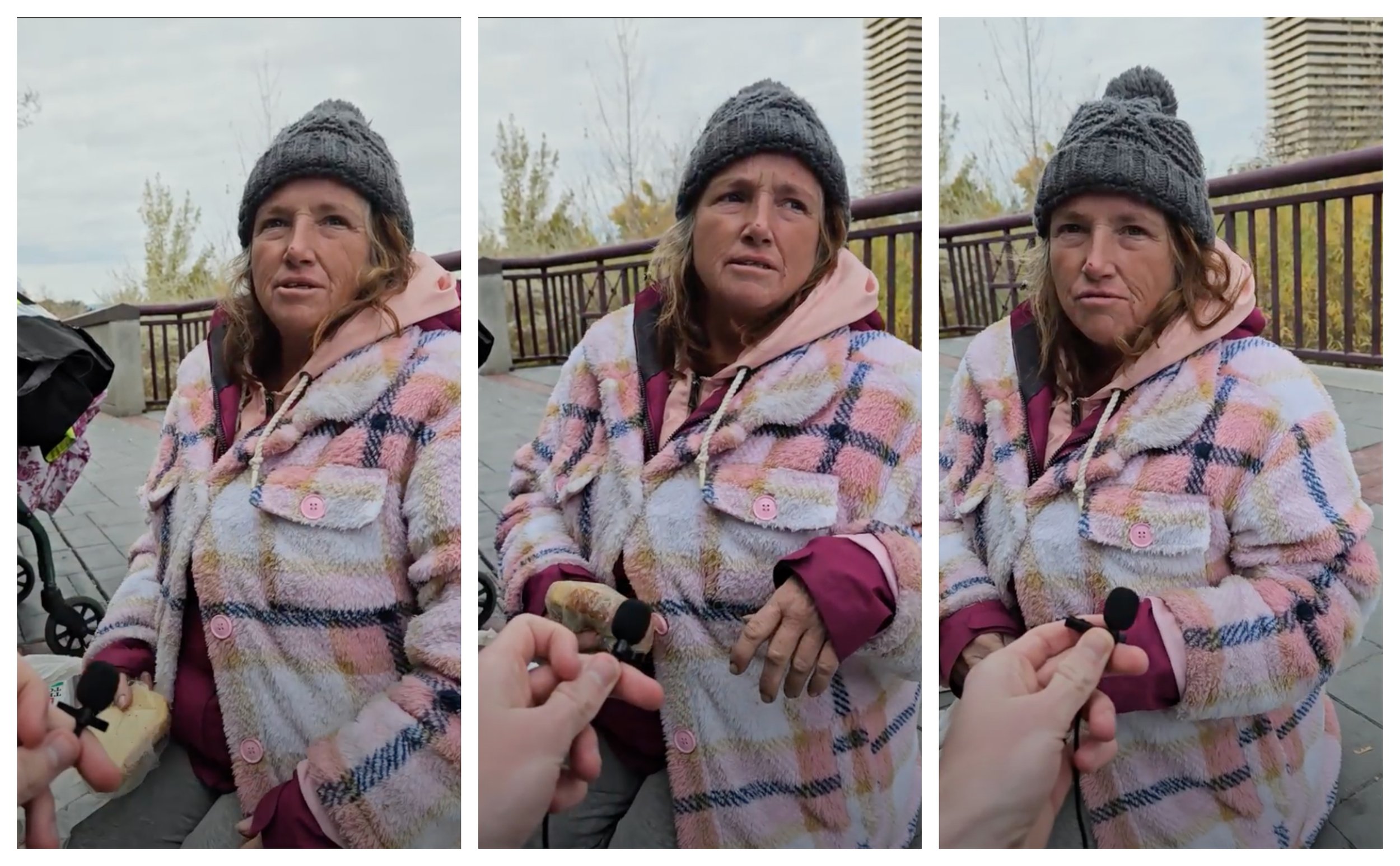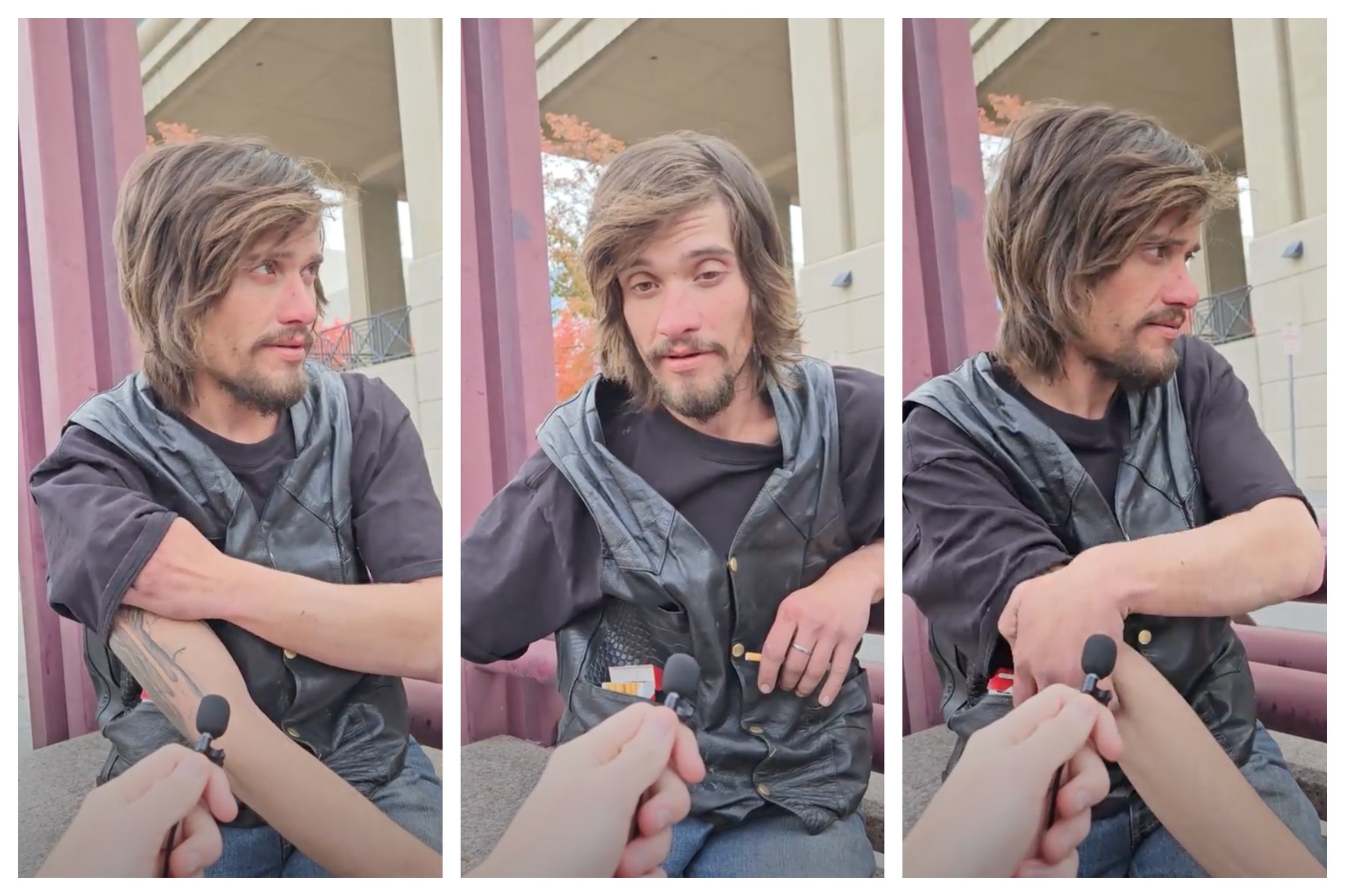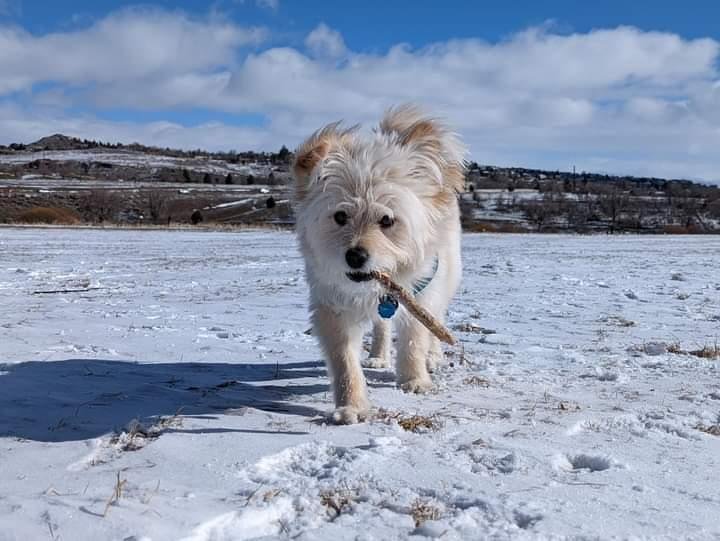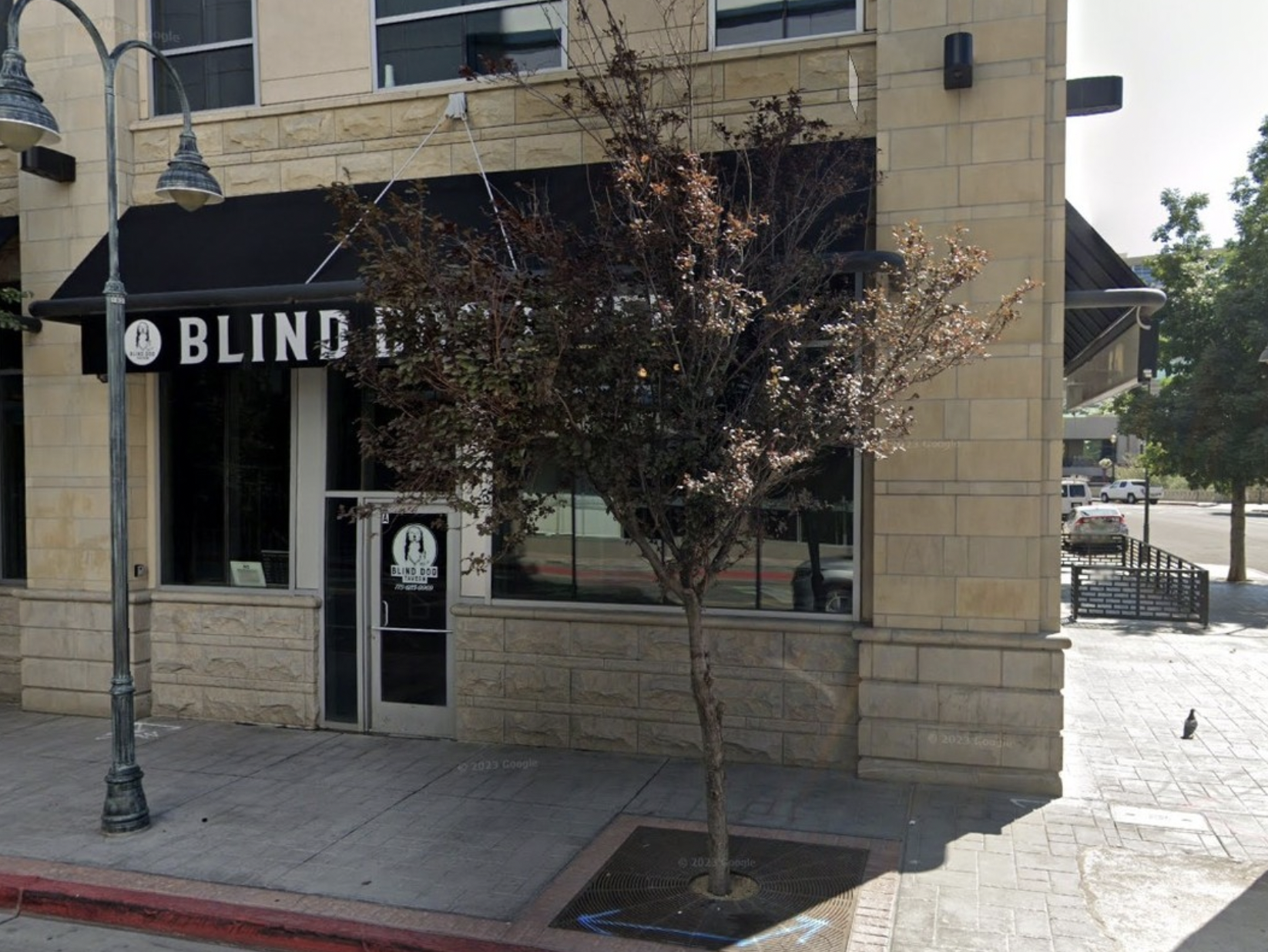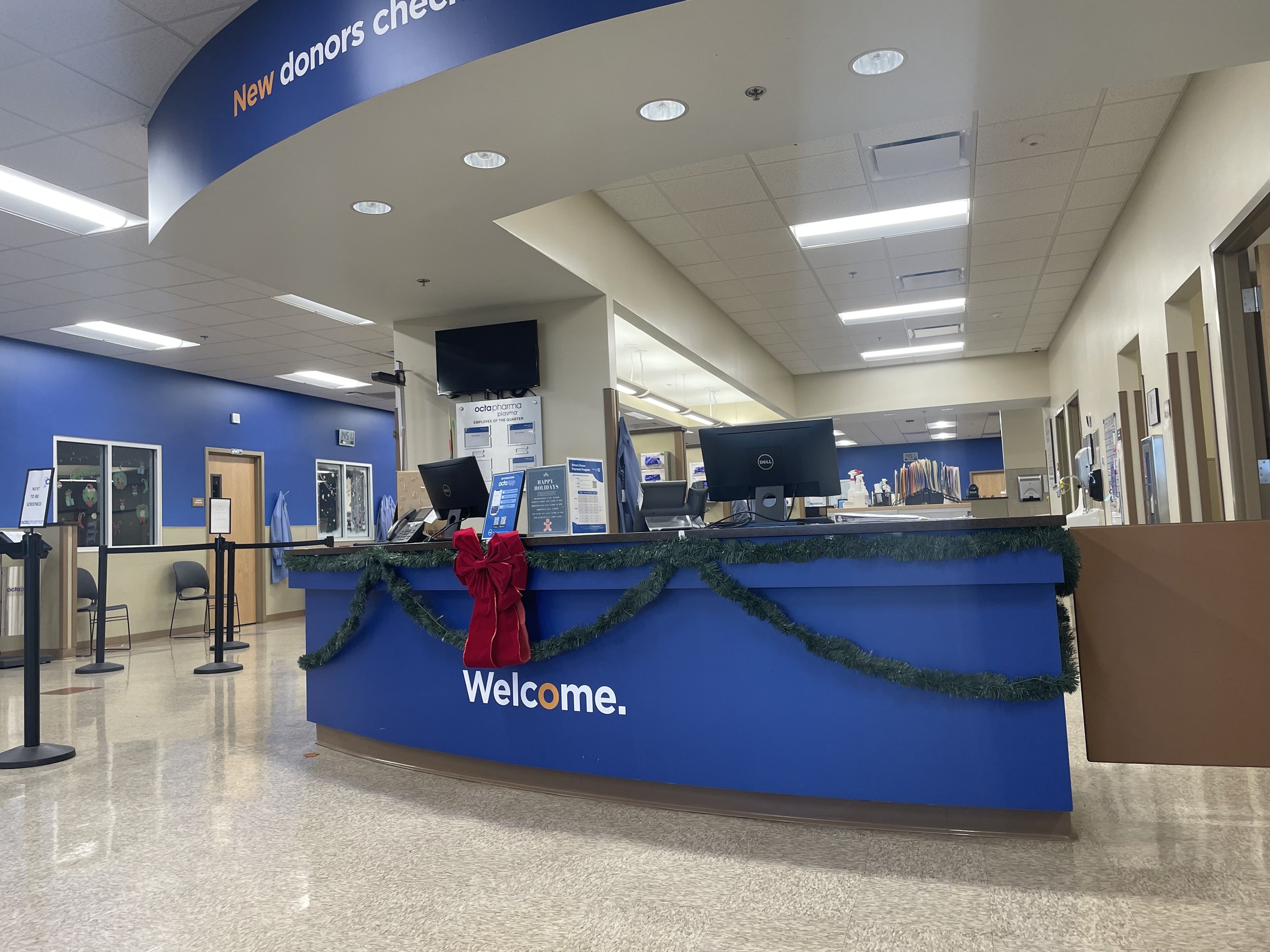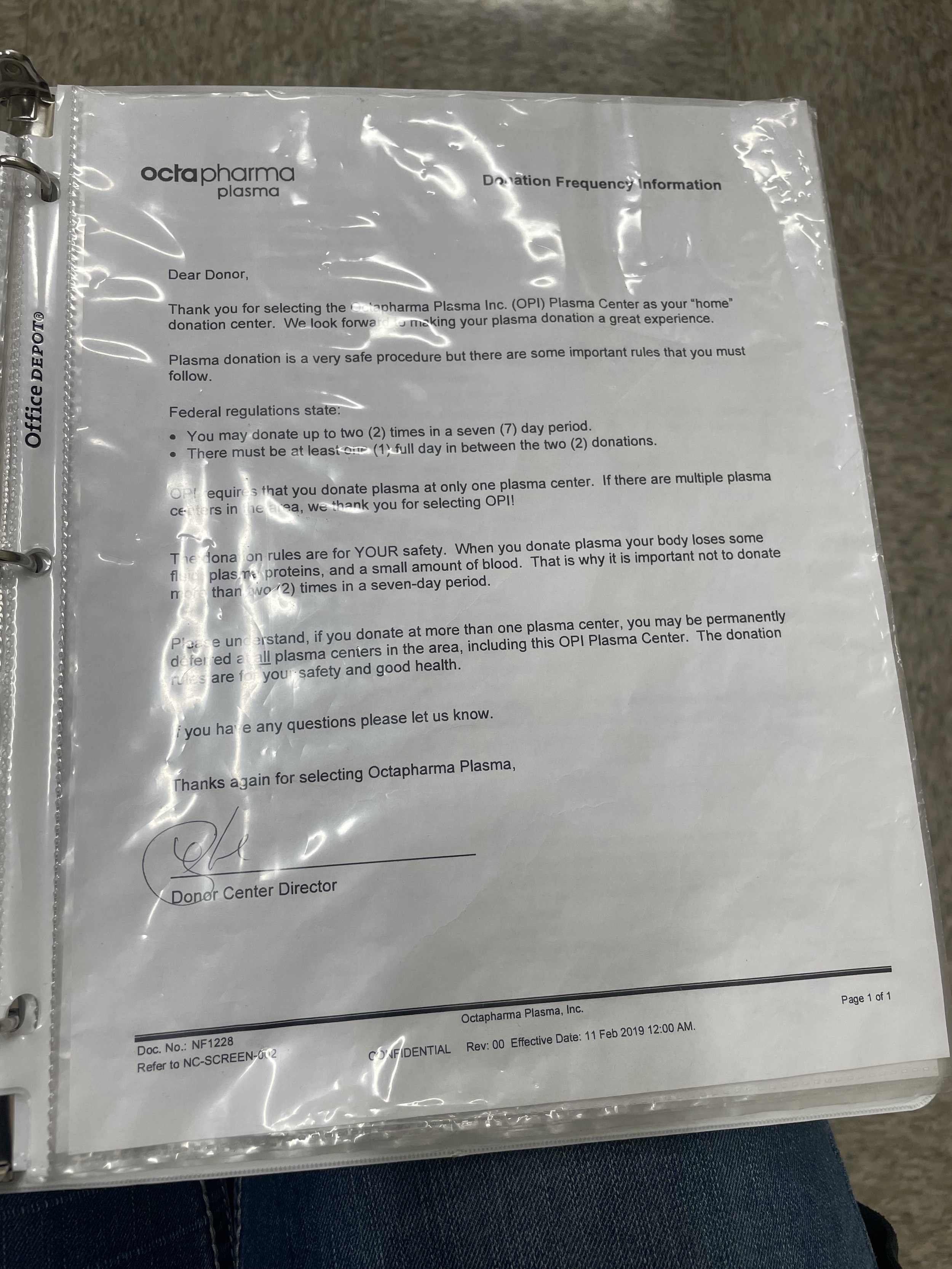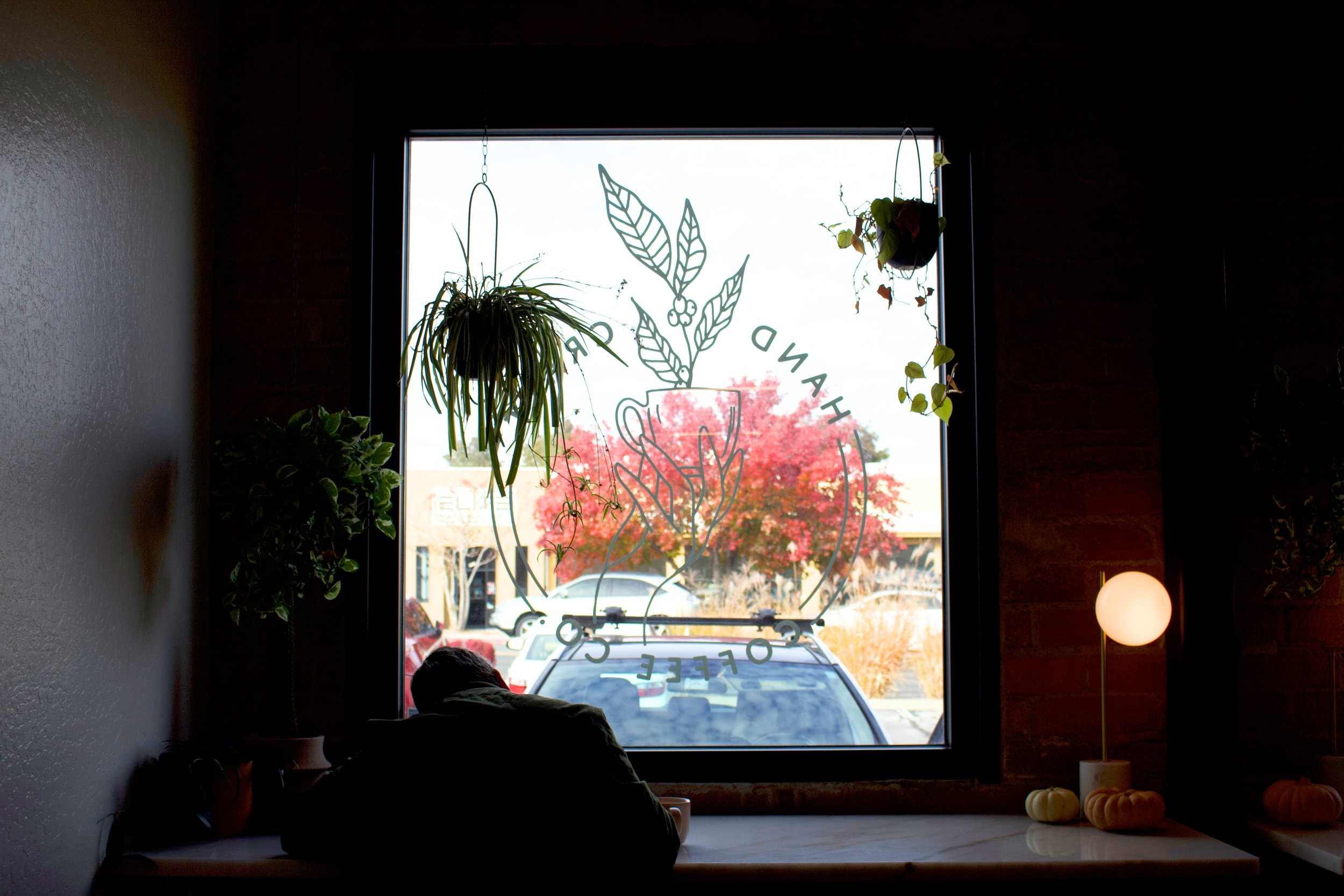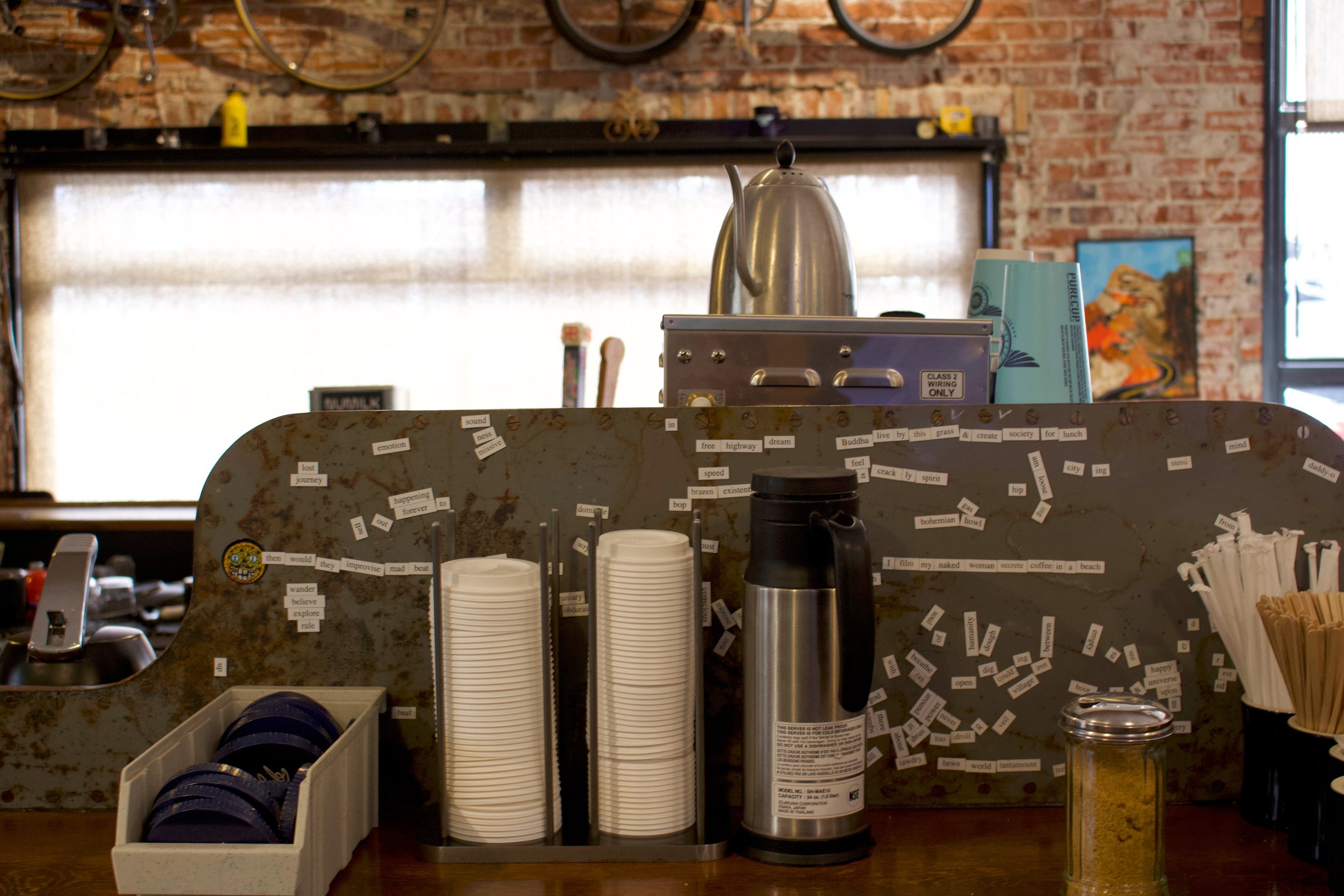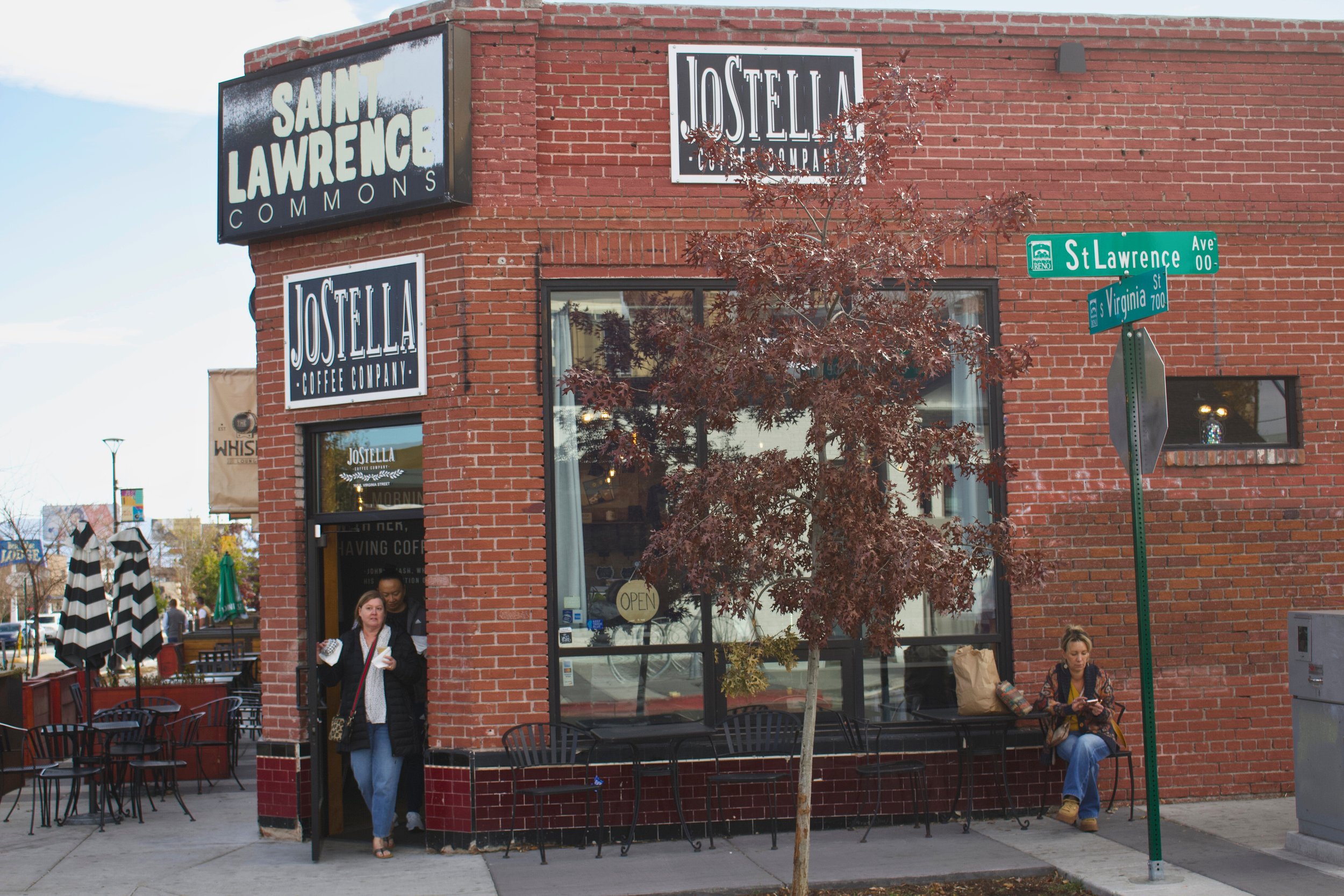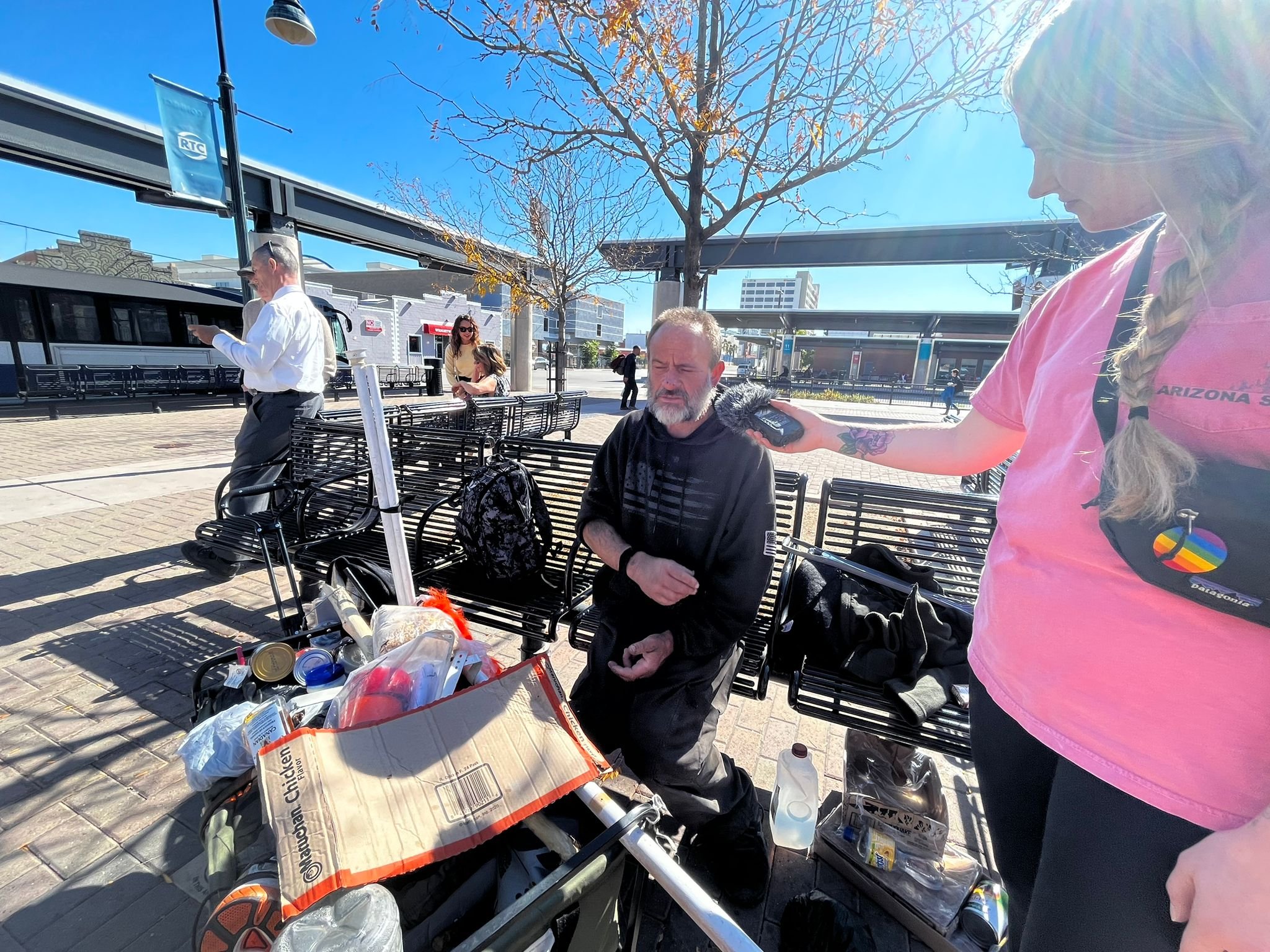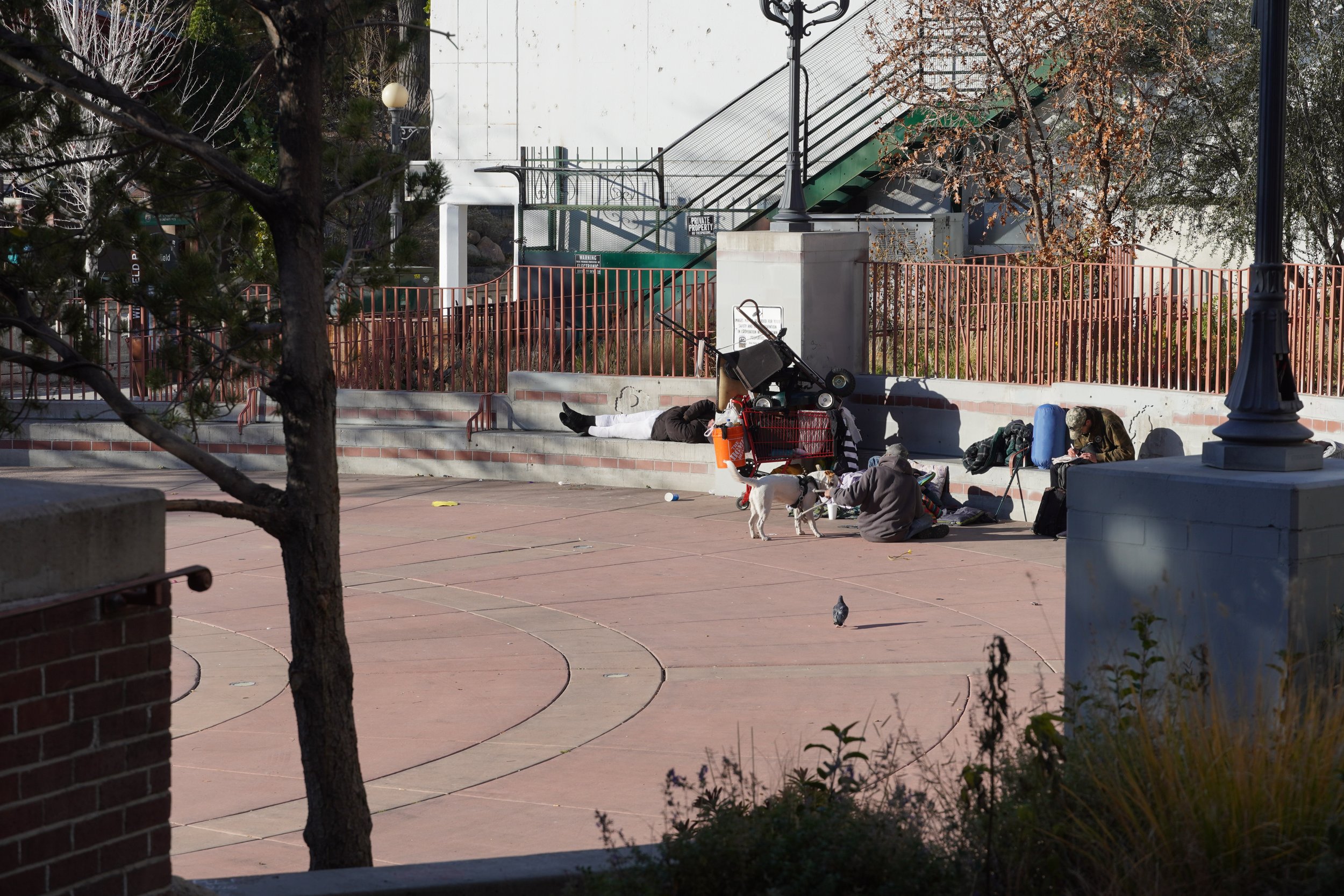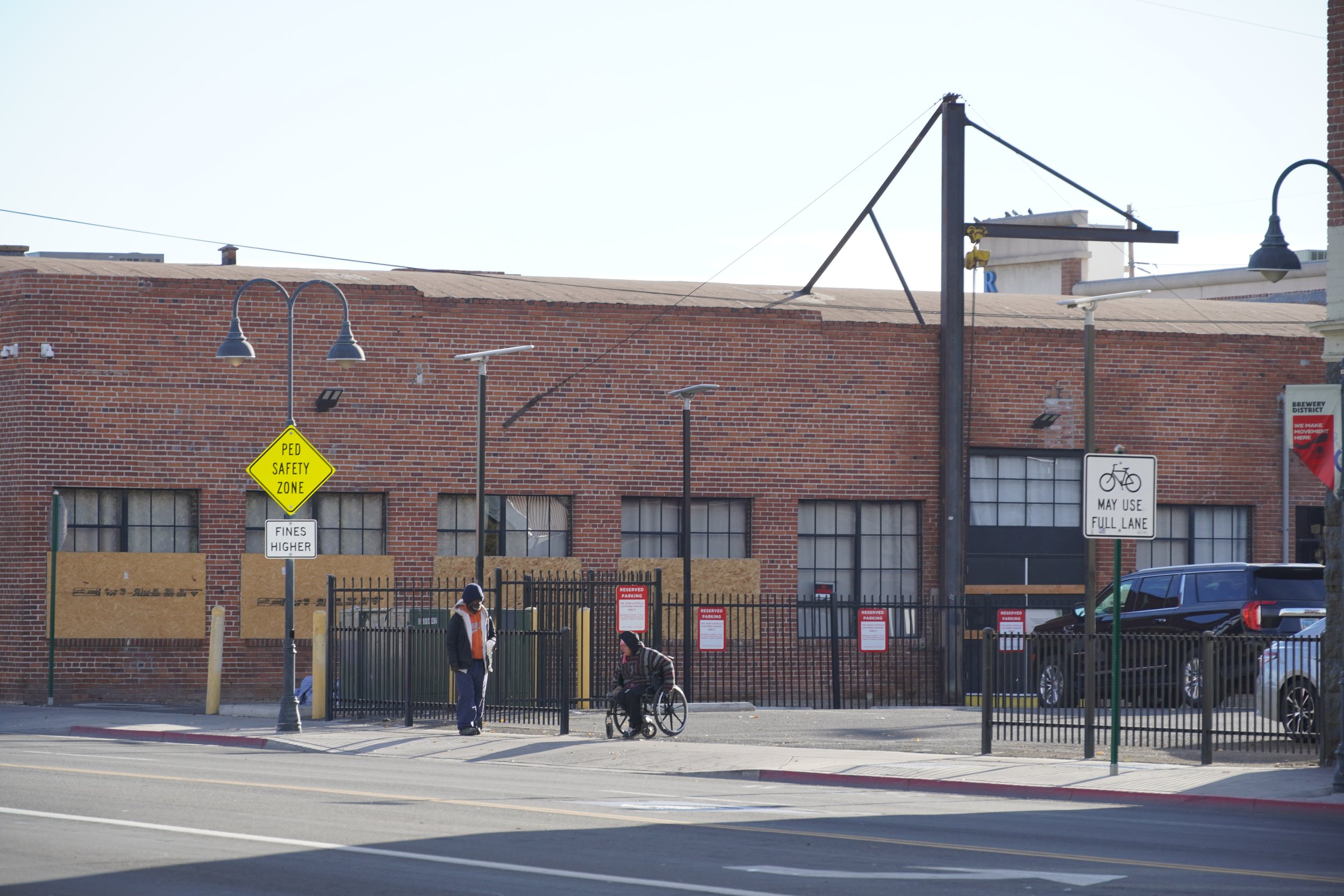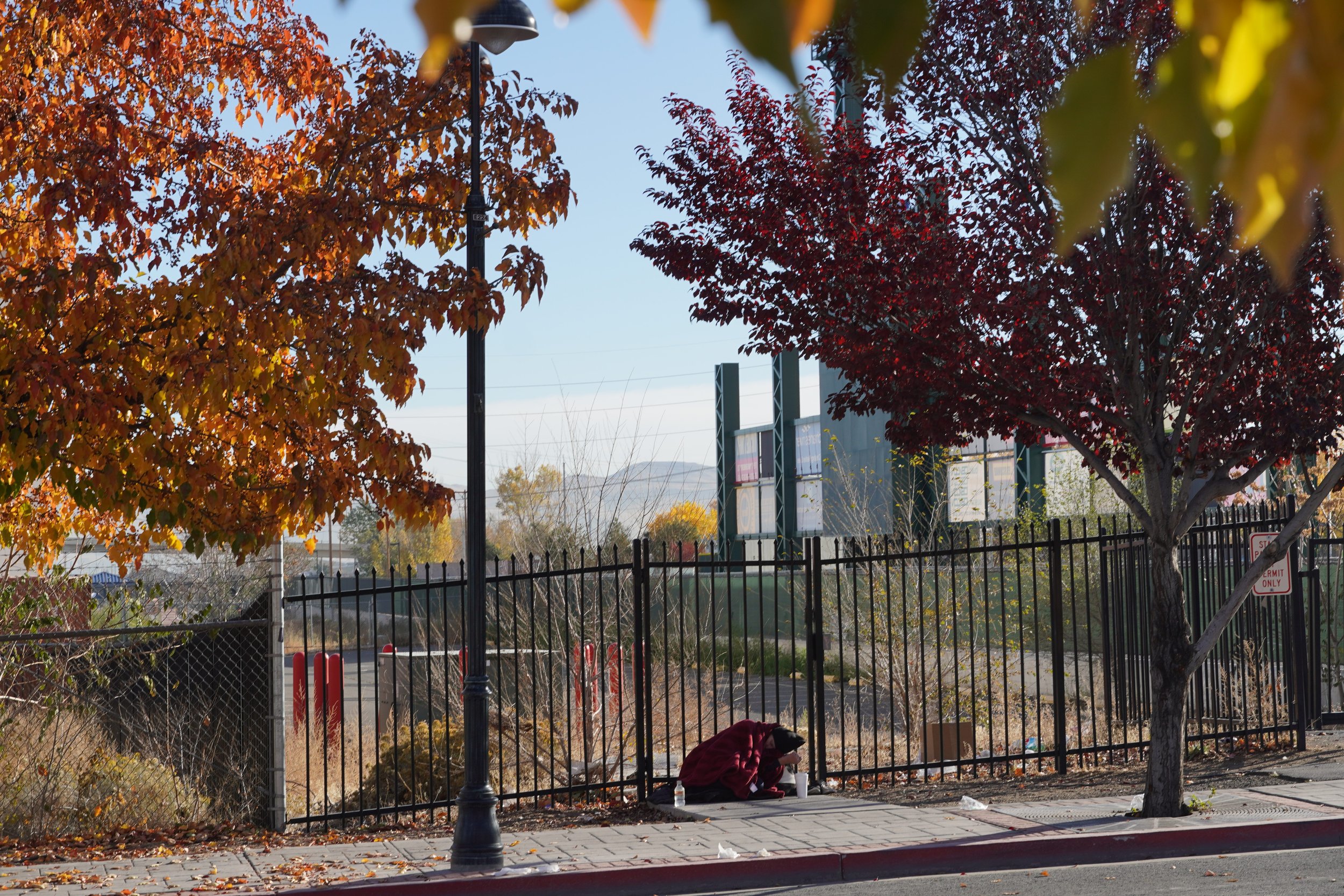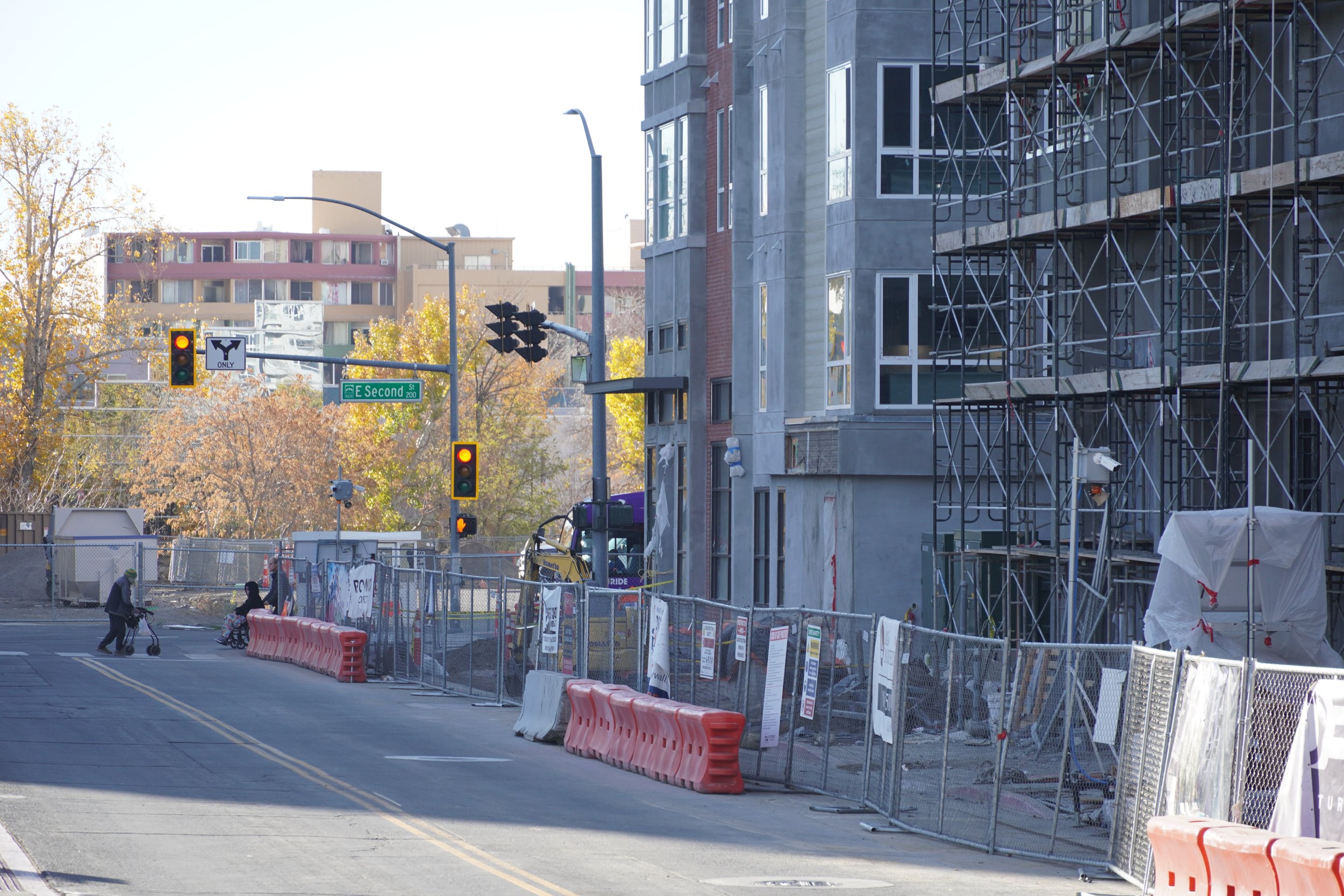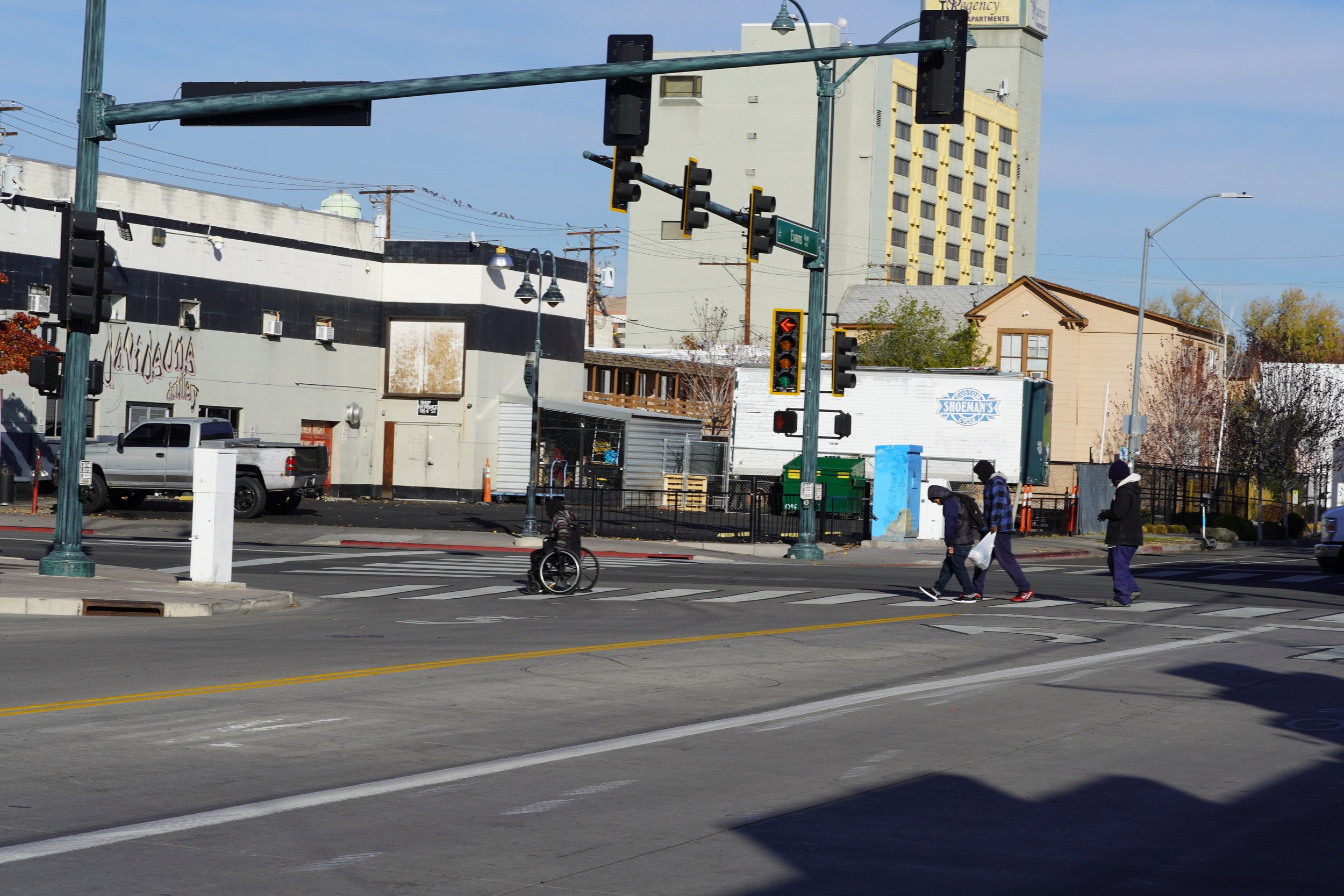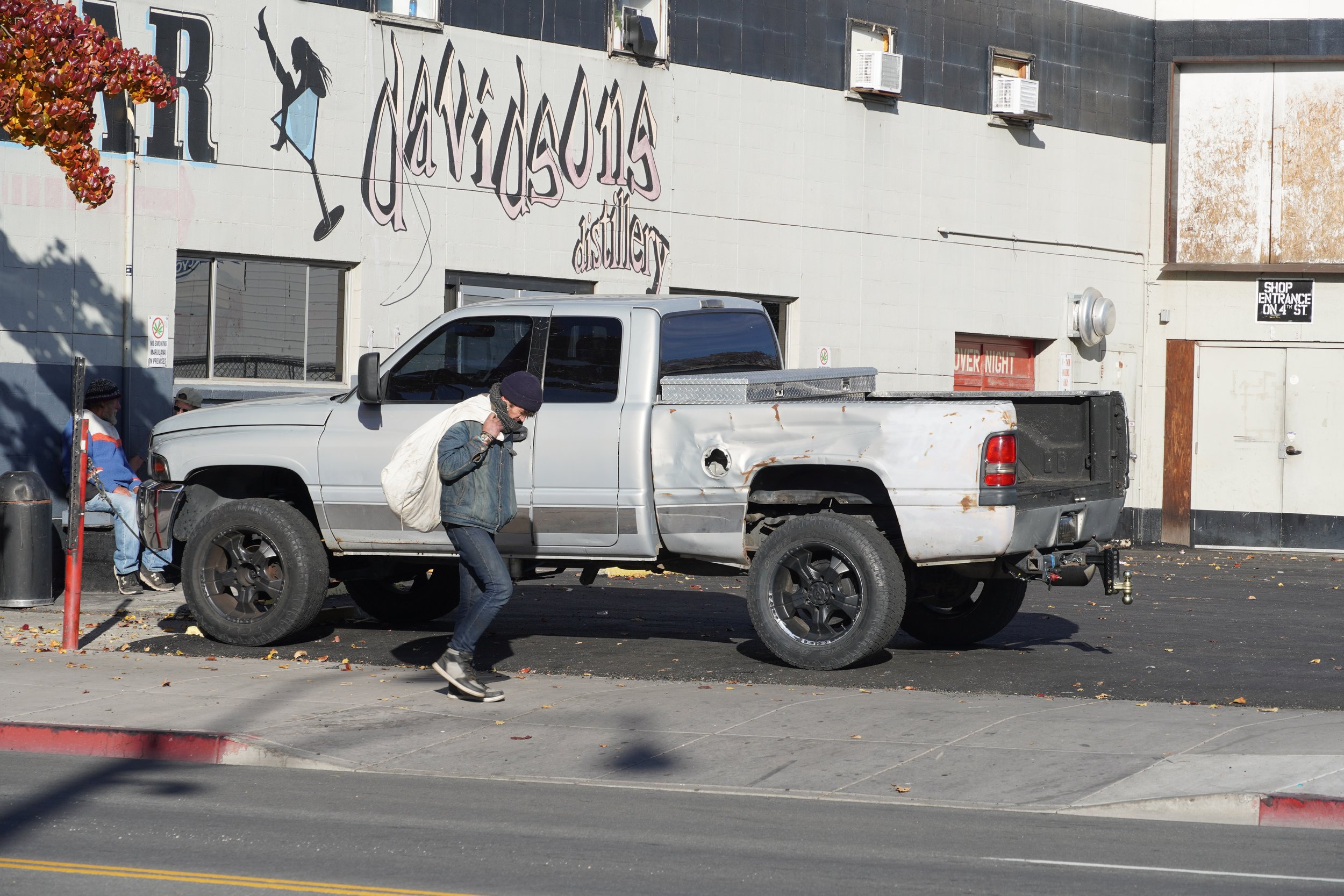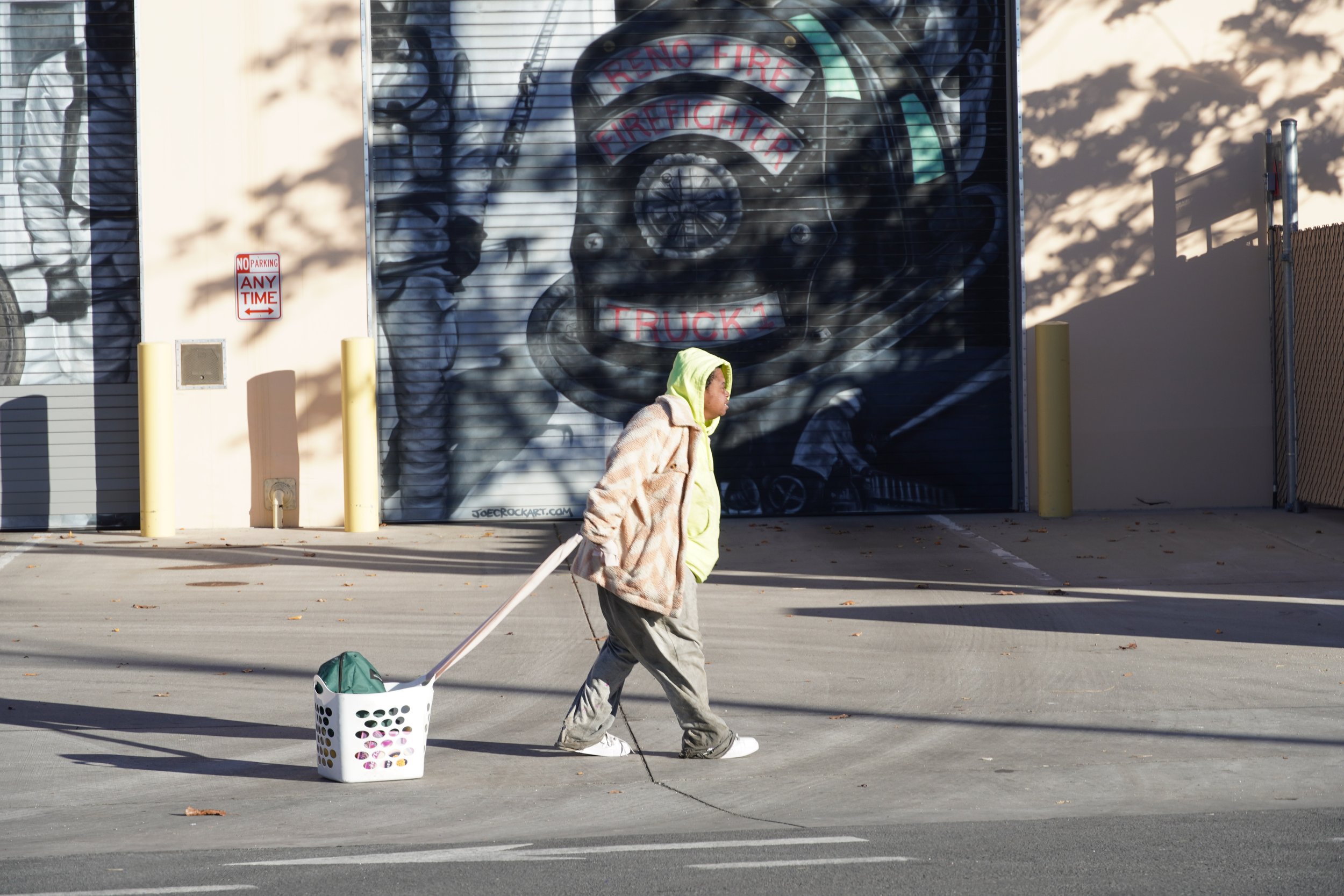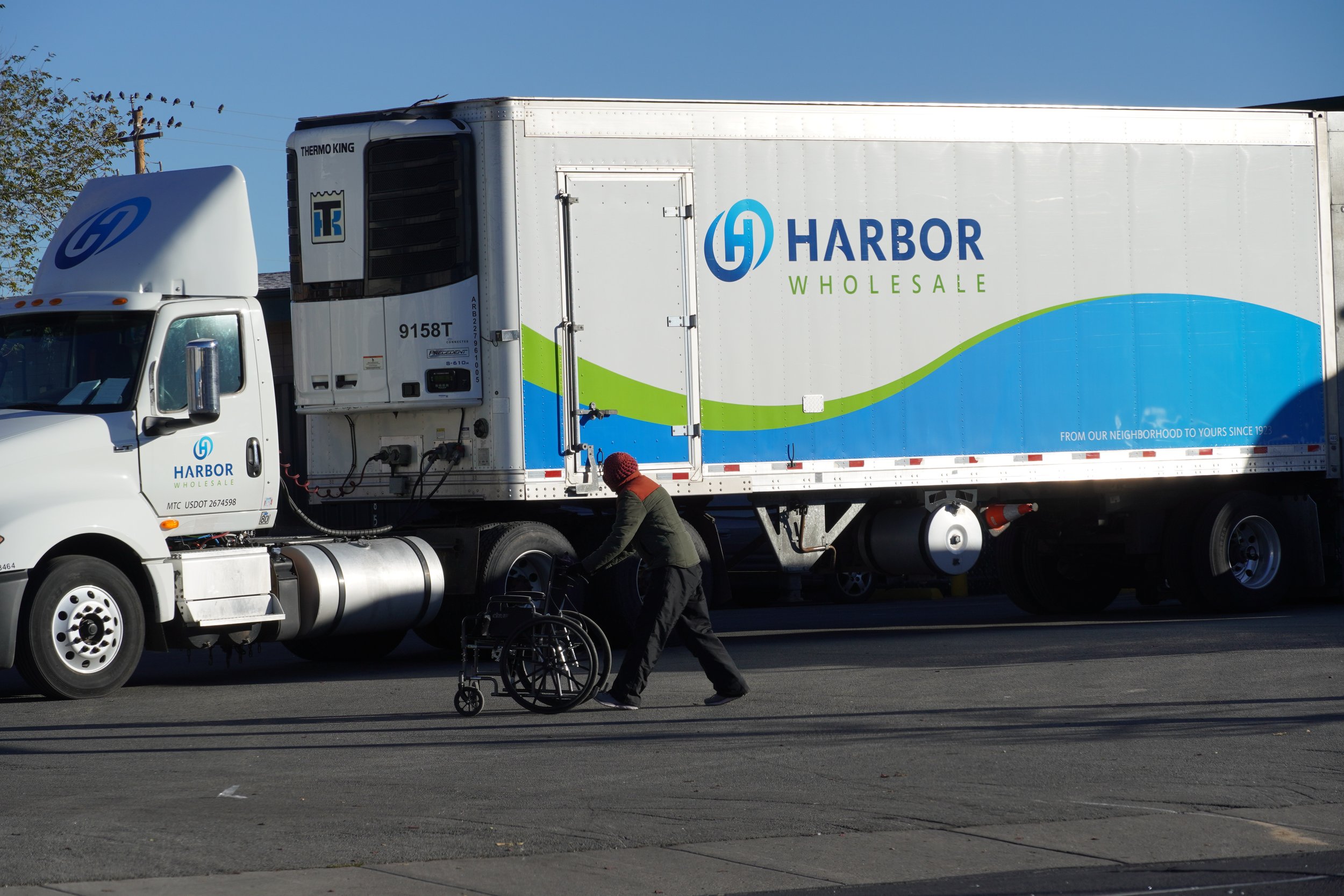There's ever so slow movement on the Lear Theater at 501 Riverside Drive with the City of Reno now looking for a consultant to help with its next act.
"The City of Reno is currently accepting sealed submissions for a qualified consultant for a Historical Structure Report – Lear Theater. This Request is exempt from standard NRS §332 guidelines per Chapter 332.115(1)(b). Sealed submissions will be received until 3:00 pm, 01/29/2024, via our online portal. Said RFPs shall be opened no earlier than 3:05 pm 1/29/2024," an email from today indicated.
A week ago, Devon Reese gave details on how the City is spending the $1 million in ARPA funding it voted for in March 2023 for improvements to the once majestic, now falling in disrepair and still barely standing Lear Theater, to include landscaping and fencing.
These were the councilman's detailed bullet points:
"Clean and inspect the interior of the building to identify any urgent issues that threaten damage to the building (for example, broken windows, evidence of pest infestation, or water damage).
• Restore the historic landscaping to include a new lawn and perimeter plantings, irrigation repair, and installation of outdoor electrical power.
• Improve building security by installing an attractive perimeter fence, repair existing
exterior lighting, and install wireless security cameras.
• Engage a consultant to perform a Historic Structures Report to evaluate the building’s
current condition and recommend new uses that are compatible with the building’s
historic fabric.
• Repair deteriorated concrete walks and stairs in the building’s exterior grounds."
Activists have called for the 1939 building to be a center of local Black culture as it was designed by the iconic Black architect Paul Revere Williams.
Its name comes from Moya Lear who purchased the building and donated it to the non-profit Reno-Sparks Theater Coalition in the late 1990s, after housing the local First Church of Christ for decades.
It's been in limbo and mostly disuse for years since, with the City of Reno the latest to try to save it and give it a new active purpose.
Our Town Reno reporting, January 2024
Local Union Leaders Seek to Build Momentum off of Strong 2023
As in the rest of the country, 2023 was a momentous year for unions in Northern Nevada. At the very end of the calendar year, Tesla said it would raise pay for gigafactory workers amid a union push. In October, the Washoe County School Board approved 20 percent raises for teachers as part of two-year bargaining agreements.
In September, dozens of workers at GM’s Reno Parts Distribution center went on strike in solidarity with 37 other locations across 20 states. Represented by the United Auto Workers Local 2126, the workers held signs and chanted pro-labor slogans outside the sprawling 400-thousand square foot warehouse in the North Valleys.
By the end of October, the UAW had reached tentative agreements with Detroit’s Big 3 automakers: Ford, General Motors, and Stellantis, owned by Fiat Chrysler.
“There are a lot of other employees in northern Nevada that we're still trying to fold into the Northern Nevada Central Labor Council because at its basic, most basic, we're strongest when we work together,” said Wendy Colborne, the communications director for the CLC as well as for the Building and Construction Trades Council of Northern Nevada at a recent gathering of local union heavyweights.
“And the more of us we can pull together into a unit, that's the whole principle of a union in the first place is that we're stronger working together. So trying to bring everyone together to have that voice not only in their workplaces but at the legislature.”
Colborne was joined in discussing current labor strategies in a small conference room in the local Teamster’s office, tucked into the hills above North McCarran Blvd., with Gary Watson and Ross Kinson both from the Teamsters Local 533 joining in.
Pro-union photos, posters, and framed press releases line the walls of the main room, halls, and the conference room.
“Essentially, we're a broad union for the most part, and the backbone of us is, you know essentially the trucking world,” Watson, the President of Teamsters Local 533 in Reno explained.
“We have a lot of UPS workers, within the garbage industry waste industry, city transit, numerous things to that aspect. We represent the workers and negotiate contracts on their behalf, make their living wages better and conditions, you know, whether it's healthcare, pensions or their hourly wages, to bring them into the middle class.”
Watson says he was a good fit for the role of labor organizer because he has always been willing to make trouble with bosses, or in other words: advocate for workers.
A food pantry the local Teamsters union runs to help with community needs, amid rising prices.
Kinson, a so-called business agent at the Teamsters Local 533 is also president of the Central Labor Council. Like Watson, he began his career at UPS, eventually taking a pay cut to go to work in the support side of organized labor.
“The sentiment is that young people should be reaching out to us and should be very openly talking if their workplaces suck,” Kinson said in a matter of fact, no holds barred way as his appreciated style.
“They should be organizing,” he added. “They should be contacting us. They should be reaching out to us and we will go in and we will fight tooth and nail to make sure that they have a better workplace.”
Unions provide workers with the ability to negotiate for better wages, benefits and working conditions, protect legal rights for workers, provides community, political influence, education, training and solidarity. Historically, on the national level, unions which formed in the mid-1800s helped institute 40-hour work weeks, eight-hour work days, weekends, paid vacations, sick leave, health care, overtime benefits, holiday pay, pregnancy and parental leave, breaks during the work day, child labor laws, unemployment insurance, improved working conditions, pensions and retirements, sexual harassment laws and Social Security benefits among a long list of crucial accomplishments.
File photo of this year’s Reno LaborFest.
The Reno LaborFest, held this year on Sept. 4 at Idlewild Park is now a highlight of the local public calendar, but Colborne explains there is plenty more the Northern Nevada Central Labor Council and their partners provide on a regular basis, from training and apprenticeship, to tools and workwear, job placement and even food assistance.
“Not only do we put on the Reno Labor Fest, which is an awesome hands-on event where you can come and check out our apprenticeship programs, but we've also been working with Washoe County School District to implement a union pre apprenticeship program in Washoe County high schools as part of their CTE career and technical education.”
Colborne explained the apprenticeship program is earn-while-you-learn, tuition free, with guaranteed job placement. Assistance with the costs of books, tools, and supplies is available.
In the back of the Teamster’s office, three rows of tall metal shelving stand neatly stacked with cans and boxes of non-perishable food items across from a folding table covered in produce.
Collecting and distributing food donations to striking workers is a longstanding tradition of organized labor. Here, food assistance from the pantry is actually available to anyone in the community regardless of employment status or union membership or whether or not a strike is going on.
That afternoon, the Teamsters office was paid a visit by Scabby the rat, a 20 foot tall inflatable rodent with visible scabs in reference to the common name for strikebreakers or anyone who crosses a picket line.
In Northern Nevada in recent years, the high cost of living and a rampant lack of affordable, accessible housing combined with a large sector of low wage employees in industries like hospitality and retail have created a regional economic environment with limited prospects for upward mobility.
For the Teamsters and the Central Labor Council, the challenges residents face locally underscore the need for strong labor unions and the power of collective bargaining to lift hard workers into the middle class.
Reporting by Andrew Zuker shared with Our Town Reno
Russel, Trying to Turn it Around for 2024
Russel who was recently incarcerated for several months and has been staying at the Nevada Cares Campus is hoping for a better 2024 for himself.
“I’m going to get around it,” he says of his predicament.
A caseworker is helping him and he says he’s following the plan he's been given to get back into housing to the letter.
He urges politicians to let people get stable in order “to get them on their journey.”
He says he’s been a musician, playing the keyboard among other instruments.
Russel says he’s retired but can’t get his benefits yet.
He waited several days before getting a bed at the Cares Campus compound, where he’s now been staying for nearly a month, and remains optimistic for a turnaround.
What are your own hopes for 2024?
Photo and interview notes by Dani DeRosa
Phil, Struggling with Scoliosis, Outside the Cares Campus
The Built for Zero program Washoe County is pursuing aims to end homelessness locally.
Every person still unhoused deserves to be heard which is one of our goals with this reporting initiative, to have the community listen to their perspectives and experiences.
It breaks our heart to see the elderly and disabled spilling in and out of the Cares Campus, morning, day and evening.
Phil who suffers from scoliosis is one of them.
He says he received help obtaining his wheelchair from the Saint Mary’s hospital.
He doesn’t say how long he’s been in Reno. “Too long,” he says. He is currently trying to get his ID back. He says his wallet was stolen at one point in the middle of the night, that he’s scared and doesn’t feel safe.
People don’t really change, he said. “We’re paying for a nasty nature, a sinful nature” was one of his direct quotes.
Photos and interview notes by Dani DeRosa shared with Our Town Reno.
Melody, Between Tents and Motels, Hoping her Belongings Wouldn't Disappear
As part of our series of interviewing neighbors who avoid the local shelters, we recently interviewed Melody, who lives between motels when she has money and the streets in a tent. She complains about getting her belongings stolen repeatedly, and wishes there would be an available legal camping spot for the unhoused outside of the Cares Campus. Melody was interviewed for a video series by Cole Payne.
“My name is Melody. I'm originally from San Francisco, California, but I moved here with my parents when I was 11.
I am like a hundred percent permanently disabled.
It's been about four years that I’ve been homeless off and on.
They pretty much don't like tents up, which I don't understand that. I mean I do but I don't because they do need to keep the streets clean and all that stuff. But everybody pretty much picks up their own stuff and they take their tents down every morning. But if you put up a tent, that like attracts attention, but it keeps us warmer…
We're only allowed to put them up when it's raining or when it's about to rain and only at night.
We don't agree with the camping laws that they're giving people tickets for camping.
We do try really hard. We get like usually a room, like a hotel room or a motel room somewhere. And we stay as long as we can until our money runs out. And then we have outside. So we're not like outside like day in and day out. At least like once a month we're in for probably maybe about a week is what our money covers, you know, to be inside.
And then the ambassadors, they really do help out a lot. But some of them get a little bit pushy. They go around and wake everybody up, but then sometimes they make you leave. Sometimes they just start taking your stuff … for no reason. And so we've lost a lot of stuff…
The park rangers, the parks and recreation people, I mean, some of them will just take your stuff right in front of you and put it in the back of their truck …
And so that makes it difficult when they come and take your stuff.
Sometimes, you just have to run to the bathroom, you know, and you don’t maybe take five, 10 minutes to run to a bathroom and come back and your stuff will be gone and you'll never see it again. Because they do that.
People might have stuff that's worth a lot of money here or stuff that isn't theirs that they're watching for somebody else, but they just couldn't stay and watch it 'cause they had to run to the bathroom. They'll be back, you know, sometimes you'll come right back or you'll only turn your back on your stuff and it disappears.
Rather than just leaving the people's stuff alone, you know, unless it's been sitting there for a substantial amount of time, like if it's been there for like over two days just sitting there.
If I was one of the city workers, I would definitely take the stuff but leave a notice or something right there wherever the stuff was and let 'em know where they could pick their stuff up at because it had been there for a certain amount of time.
We have lost so much from them, the parks and recreation people, doing that to us because well, we ought to clean this place up, you know, with our dogs, it looks bad.
I mean it's not like we're throwing our garbage all over the place because we do pick up all our garbage and put it in the trash and we even have our own trash bags.
When they take your stuff before night, you lose what you need and you end up getting sick and freezing.”
Our Town Reno reporting by Cole Payne
Jake Jacobson is Country Rising with Reno EP
Jake Jacobson thanks a crowd for their attendance after performing. Photo provided by Jake Jacobson with permission to use.
Walking into the Coffee Bar in northwest Reno, Jake Jacobson, a country music artist and self-described crooner, is enjoying some much-needed downtime. As he enjoys a cup of black coffee, with his mirrored sunglasses and baseball cap on, it does not seem like he’s in the midst of performance season.
Jacobson, 26, has had a love for music since he was a young boy. From his parents singing “Neon Moon” at bedtime, to singing the same song with his father’s band since he was four, he’s now the one on center stage, following his passion for music, trying to make a name for himself in Nashville.
On his website he writes, “with roots in Reno, Nevada and an upbringing in a Northern California ranching town of 2,000 people, Jacobson finds himself drawn to the stories and lifestyles of the unique characters intersecting his life. And those are precisely the people and places that jump from the speakers on his latest work, the four-song EP Reno.”
During the recent coffee interview, Jacobson explained how his determination, work ethic, upbringing and relationships have been a successful formula.
“I was on Team USA Gymnastics for a long time,” he says. “When I was at the height of my career [during high school], music was the stress release.”
Jacobson says being away from home for long periods of time for competitions in high school prepared him for the life he is currently living.
“Staying motivated is a little bit easier for me than most, I would say, because I know what it takes to be successful at an elite level in something,” he said.
Jacobson is not currently signed with a record label, but has already released eight songs. “Everything that we [he and his band] come by comes from the grind of hard touring,” he says.
He fully owns his songs, but it can cost him up to $6,000 to produce each of these.
“It takes about a million streams to make back what you made,” he says of the current music economy.
Photo provided by Jake Jacobson with permission to use.
While developing his social media following, Jacobson has also turned to several more experienced musicians who have become mentors, like Randall King and Cody Johnson.
“Randall’s about the closest thing that I’ve ever had to a big brother,” Jacobson says.
King was the first to invite him to the country music capital. In Nashville, Jacobson has acquired a publishing deal as a staff songwriter, allowing him to travel there a week or more every other month, schedule permitting.
His advice for other young artists is to “listen and take in everything that you can. Be a sponge.”
As he prepares to leave Reno again, Jacobson expresses his love for the Biggest Little City and mentions the Reno Rodeo has been one of his favorite venues to perform.
“Well that tank is full of diesel and that truck's already pointed out the drive. Even though you’re tryin to hide it girl I see the same ol sadness in your eyes. Don’t it seem like goodbye always goes this way. And baby you know I’d really love to stay. But that tank is full of diesel and that truck's already pointed out the drive,” he sings in one of his most popular tracks Rollin’ Stone.
Story by UNR student Madilyn Meyers shared with Our Town Reno
Canines for Christmas - “The poorest reason in the world to buy a dog”
Above AI generated images with the prompt “a painting of a child opening a package for Christmas that has a dog inside.”
The magic that is a puppy being unwrapped on Christmas morning has captivated Americans for decades. Many have seen videos of smiling children or significant others bursting into tears at the dog under the tree. Some have been able to experience it themselves.
“That’s the poorest reason in the world to buy a dog,” counters Jack Riggsbee, show chairman of the Reno Kennel Club (RKC). “Because in the first place, you’re buying it for someone else.”
First and foremost, a puppy, kitten, or any other small animal is a living being. A pet of any kind is a responsibility that takes proper research and should not simply be a surprise gift. This will be a common theme going forward in this article.
“It’s a conversation that needs to be had with the whole family,” Rebecca Goff, Nevada State Director of The Humane Society of the United States (HSUS), said. “It’s a conversation that needs to be had with the person receiving the gift, to make sure that they’re ready.”
Puppies, as adorable and sweet as they are, can be a lot in a small package. Goff, who made it clear she will likely never get a puppy again, explained. “They’re like babies,” she said. “They will tear everything up, go potty everywhere. You need the time and resources to train that dog.”
Not only that, puppies are a longer commitment than some may expect. Goff described how, depending on the dog, it can be a “10 to 16, 17-year commitment to that animal.”
WCRAS Program Coordinator Quinn Sweet pointed to pet rabbits living unexpectedly long as well, with a lifespan of upwards of a decade. She explained how the WCRAS typically sees an increase in abandoned, non-native rabbits shortly after Easter, likely bought for the occasion.
Puppies don’t stay young forever, which can change dynamics in more challenging directions as well. Huskies, for example, are adorable as babies. Past that puppy phase, they can be extremely difficult for unprepared owners. They’re even being regarded as one of the hardest breeds to train. They require plenty of space, exercise, mental stimulation, and a lot of grooming.
Huskies also won’t fit in with a sedentary lifestyle, cooped up in an apartment all day as their owner is at work. Goff described seeing Huskies chew through walls, crates, and even garages “because they’re bored.”
“You have to really do that research and be diligent about that before you get the cutest puppy you come across,” Sweet said.
To her, a “responsible pet owner” is somebody who takes time to understand the needs of their dog prior to adopting one. They need to understand their own lifestyle and if the animal fits in. There is also the need to understand costs of owning a dog throughout its life, from food to vet visits and unexpected medical problems which increase in likelihood as they age.
Rising inflation has caused sky-high prices for all Americans, and pet owners are feeling the brunt of it. Simply getting an animal in for an appointment is also becoming more difficult following the pandemic. Strict housing requirements and exuberant pet rent costs in Washoe can also put owners in a difficult position.
Riggsbee has seen the impact within the RKC, which is the local chapter of the American Kennel Club. The shows they host bring dog owners from out-of-state, and increased travel and hotel costs cause difficulty. Riggsbee, who has spent thousands of dollars on this passion with little profit, notes people leaving the hobby entirely because of the cost.
Owning a pet of any kind can be incredibly expensive. Thankfully, Washoe County does have multiple programs to help, such as the Nevada Humane Society’s Pet Pantry or the affordable clinic Options Veterinary Care.
Asking for help doesn’t indicate weakness or failing your pet. Now, it’s time to “step up” as a community and create a space of understanding, and support for struggling owners, Goff said.
One more responsibility that some aren’t prepared for is the end of their dog’s life.
“Around the holidays we do see an unfortunate trend of older, senior animals being abandoned,” Sweet said. “Which is very sad. Because people want to get puppies for the holidays. And, you know, they don’t want to deal with the end of life care for their animals.”
For Sweet, there needs to be a better understanding of the uncomfortable topic of death and the options available to owners. Preparing for the end of a pet’s life is just as important as first bringing it home.
Taking care of a dog can be physically, emotionally, and financially taxing. Experts interviewed for this article say it’s not a responsibility that should be gifted for Christmas.
As Goff said, if you really do want to give the gift of a puppy, make sure to have a discussion with whomever you plan to do so for. Ensure they are ready and willing to take care of the dog for the entirety of its life.
Part 2 of a Dogs of Washoe County series by Cole Payne shared with Our Town Reno
The Hillygus Lightning Rod for Washoe Jail Conditions and Guardianship Reform
When an inmate was reported dead at the Washoe County jail earlier this week, advocate Aleene Carrino sent a worried email fearing it might be Roger Hillygus, who is facing charges of kidnapping his mother from a Reno Alzheimer’s care facility in 2019 and taking her across state lines to California.
“We pray it’s not Roger Hillygus because his last report was yesterday around 12:30 p.m.,” Carrino wrote. “He is very sick with some type of intestinal illness.” Carrino says Hillygus, who is in his 50s, has lost 65 pounds in detention, which we couldn’t independently confirm.
“We don’t want him to die in there,” she said.
The dead inmate turned out to be Mark Forcum, who was facing an open murder charge in the death of his wife. Media have indicated Forcum hung himself in his cell.
Carrino is one of several advocates who has been leading an all out charge to clear Hillygus. While in detention, Hillygus has also become a whistleblower for renewed accusations of alleged mistreatment and inhumane conditions at the Washoe County jail.
Another advocate joining her in trying to help Hillygus and also improve conditions at the Parr facility is Annemarie Grant, whose brother Thomas Purdy died in 2015 after being hog tied at the jail, leading to large settlement payouts.
A third member of the pro-Hillygus team trying to raise awareness with media and keeping in constant contact is Matt Skarlatos. What unites Skarlatos and Carrino to Hillygus are lived experiences in guardianship disputes. Skarlatos had his rights to visit his ailing father terminated in 2017 in Virginia over disputes over his care in an assisted living facility.
The Ohio-based Carrino, who has become an advocate for the elderly and disabled as well, had her own guardianship disputes concerning her mother.
“A lot of us, we follow each other’s cases, we try to support one another,” she explained during a recent joint phone call with Grant and Skarlatos.
In the Hillygus case, former Mineral County Sheriff and Reno Sparks Indian Colony police chief Steward Handte also faces charges, with a jury trial now scheduled for January.
Media have reported that Susan Hillygus was suffering from dementia when Hillygus took her with Handte from the Reno care facility, allegedly without permission, saying she was being overmedicated. Hillygus was located several days later in Bellflower, California and arrested after a standoff. His mother died two months later.
Hillygus who had been out on bail was arrested again in Missouri in October last year after a decision that he had failed to report for a disputed psychological evaluation in Washoe County, where he was sent back after additional proceedings earlier this year.
Handte, who was charged with conspiracy, has admitted to helping Hillygus because a similar dispute had taken place in his own family. He told police at one point that he was distraught when he had learned that Hillygus had lost a court battle with his sister over guardianship.
Skarlatos alleges a “slick lawyer” helped “re-engineer the original trust” which had made Hillygus the sole successor trustee. These arguments now look likely to be decided in court.
The case has gotten national attention with guardianship reform advocates backing Hillygus, including a group called Veterans for Guardianship and Probate Reform. During the pandemic they started a change.org petition to recall Washoe County District Attorney Christopher Hicks.
All the while pleading his innocence, Hillygus has been conveying near constant information about difficult detention conditions for himself and others. Grant says she has been trying to get body cam footage from incidents of alleged wrongdoing advocates are being told about but hasn’t been able to get any.
“Every time I request body cam for an incident they deny all of them,” Grant said. “I don't want to see another person killed there.”
Earlier this year, Grant had written an email indicating her concern was first and foremost with “the safety and well-being of the incarcerated HUMAN BEINGS at the WCSO. I truly believe Attorney General Aaron Ford needs to exercise his powers he was given during the 82nd Nevada legislative session when AB58 passed! [This] gives him authority to investigate any state governmental authority who may be engaging in certain patterns or practices that deprive persons of certain rights, privileges or immunities and to file a civil action to eliminate such a practice or pattern.”
This past summer, a Washoe County Sheriff’s Office captain expressed concerns of overcrowding. In recent years, there have been repeated spikes in deaths of inmates at the Washoe County jail.
Speaking about Hillygus and Handte at a Board of County Commissioners meeting in April, Washoe County Commissioner Jeanne Herman said “I believe they have not been treated fairly.”
Handte himself wrote an email in April to Washoe County Chief Deputy Ralph Caldwell warning that “if my friend and co-defendant, Roger Hillygus, suffers some type of catastrophic medical event that renders him unable to go on with any [semblance] of a normal life (or worse), I will go to whatever ends, afforded to me under the legal system in this state and country [t]o make sure that you and your staff face the most severe criminal and civil repercussions available to identify, expose and take down all of you because of what you have done to my friend. Be forewarned, Chief Deputy Caldwell. This is not a threat in any way, shape or form. This is a forthright statement of fact!”
The email also included allegations of wrongdoing and mistreatment Hillygus has also been relaying which we have been unable to verify independently. Handte who was re-arrested in September for leaving Washoe County, a condition of his release while out on bail. has called conditions inside the county jail “deplorable.” Our Town Reno wrote the Sheriff’s Office asking about these comments and allegations but did not hear back by the time of publication.
Our Town Reno reporting, December 2023
An Ailing Bird Files for Bankruptcy
In a press release sent from Miami this week, the electric scooter micromobility company put a positive spin on what has been a dire shift in its fortunes.
"This announcement represents a significant milestone in Bird's transformation, which began with the appointment of new leadership early this year," said Bird Interim CEO Michael Washinushi. "We are making progress toward profitability and aim to accelerate that progress by right-sizing our capital structure through this restructuring. We remain focused on our mission to make cities more livable by using micromobility to reduce car usage, traffic, and carbon emissions."
It added that "Bird will operate as usual during this process, maintaining the same service for its riders and upholding its commitments to partner cities, fleet managers, and employees."
Bird signed its exclusive three-year franchising deal with Reno last year with the City receiving 25 cents per ride and $20 per scooter in registration fees.
Reno had previously cut ties with another micromobility provider Lime after too much vandalism and its electric bikes being piled up in heaps.
Bird's problems have been of the financial nature as it was delisted from the New York Stock Exchange earlier this year after failing to keep its market capitalization above $15 million.
It's been a precipitous decline as the Miami-based company had gone public in 2021 with an estimated valuation of $2.3 billion and making its scooters available in over 400 cities.
As operations progressed, disgruntled fleet managers were getting smaller cuts from each ride and newly produced scooters were of inferior quality with brakes failing. Buying off a competitor Spin earlier this year might have added to the pavement aches.
Canadian and European activities for Bird are not part of the bankruptcy as it plans to restructure and sell assets to lenders in a last gasp move to keep scootering.
What have been your own experiences like with Bird scooters in Reno as a rider or a fleet manager?
Our Town Reno reporting, December 2023
From the Family Shelter to Housed, a Local Widowed Mom Turns it Around
Becca says the best day of her turnaround journey was in October 2019 in top right photo in montage when she left the family shelter at Record street, ending a months long chapter of being unhoused with three kids in tow.
Since then, the journey has had challenges, but Becca, a widow who had nothing five years ago, has been relentless to make a better life for her family.
“You have to grind really hard,” she says.
Her story is illustrative of the hustle that’s needed and also how family can both be an impediment or a lifeline or both, how if you push the right doors and do the right things and get help from different organizations in town homelessness in Reno doesn’t have to be a life sentence.
Now a hospice worker, Becca had just worked a 55-hour week when Our Town Reno interviewed her recently following a comment she posted on another story, as she prepared her youngest and nieces to go to school. ‘
“Remember that no one cares more about you than yourself! Create the life you want! Save yourself [be]cause no one is coming to save you. I was homeless five months with three kids and now steady on my feet my fifth year,” she wrote giving advice to a neighbor currently struggling.
Becca says one major challenge she has had to surmount in her life was falling “in love with a felon who had a criminal record and all that other stuff. And I helped him actually. So that's the most beautiful part. When I met him, he was a piece of shit. And when he died, he was a volunteer firefighter and got baptized in the church. Like it was the most beautiful thing. He worked in construction. But when he died I had nothing.”
Formerly a Reno local Becca decided to return to the Biggest Little City while grieving her husband and scrambling to find supplies for her type one diabetic daughter.
“We took a Greyhound bus from Texas back after my husband died and our stuff got misplaced so we couldn't find some of her diabetic supplies. And I'm like, we just gotta get reestablished here.”
The wheels started spinning off though when Becca says Renown called the CPS on her when she was looking for her daughter’s medical supplies, which did arrive two days later.
Staying with her brother, nine people in a two bedroom house, created unfortunate family fireworks, as did a short stay with her mother-in-law. Her kids were 15, 14 and 6, agitated with the sudden change and grieving their father.
Becca immediately started to work at Smith’s in the deli section cutting lunch meat.
A CPS staff told her if she really wanted help though, she should go “broke and homeless.” After cops got involved following a family altercation, Becca and her kids were finally accepted into the family shelter, after days of trying to get in and being told there was a waitlist.
“It is an uncomfortable place to be because you're with random people,” she remembers of her arrival. “I actually thought it was pretty decent of a place though because it was not like a hotel room, but it was like a motel room. Like you walked in and there was a bathroom. And there was a microwave, a mini fridge, a countertop, a sink. I had a table for the kids to eat at.”
Since her kids were going to school and they were unhoused, she got help from the Washoe County Children in Transition program.
“The schools give you like free stuff and I didn't know at the time I could have upped my food stamps, but I never did. I think I had like $250 a month, which my daughter that's sick with type one, she has Celiac disease also, so she can't eat gluten. And a lot of the stuff that they would put meals out in common area for everybody … was weird. Like, I don't know, I've never seen it before, but I guess if you're hungry you'd eat anything. But because my son was picky, my daughter had an allergy and I just didn't eat because I was always so stressed.”
Her five months in the family shelter were “humbling” but it worked, even if it was uncomfortable. “They make you save money and you have to show them your savings or your checking account all the time. Like they're all in your business. You like sign your rights over to the state when you stay at a homeless shelter like that.”
She also remembers the walls were paper thin and there was violence among other families as well as on the compound.
“We would walk home down from the bus station over on Record Street and then like 30 seconds later it was filled with cops because there was a stabbing. So honestly, I think like the rawness of what we saw and went through humbled my children as well.”
A case worker helped her set ambitious personal goals, including finding her own place. She got additional help from the Bridge Church, which she had come to know through their Project 150 helping her kids get clothed for school.
“They paid $200 for my deposit and then I had to come up with the other 200. So I was able to get that deposit. So that's why I always tell people to reach out to churches. There's money in churches, you know what I mean?”
Becca was open about her predicament at work at Smith’s, and when she finally found an apartment she could afford, her colleagues helped her furnish it entirely. “You have to suck up your pride. And a lot of people don't want to do that. But you know, to me, I had three kids and I was a widow,” she said.
Becca moved into an apartment in Sparks in October 15th, 2019, and has stayed housed there since then. Her rent was initially $1,025 per month and only went up to $1100 recently, so it’s been manageable.
Interacting with CPS also became a blessing. “CPS didn't scare me because I'm a good mom. I mean, they ended up giving my daughter a trip to diabetic camp up in Lake Tahoe and paid like a thousand dollars for her to go. And they told me I was a good mom and I’ve never seen them since. I've never done drugs and I'm not like an alcoholic or anything, so that probably helps too.”
Therapy for herself and her kids, while focusing on family priorities, were other key components of the turnaround. “Therapy is where it's at,” she said of being able to manage the dark clouds and sadness in her life. “My number one priority was my kids. Nothing else mattered. Not even friends I grew up here with. Nothing.”
Change is now afoot, as a recent cockroach invasion in her apartment as well as new romance in her life is making her move.
“I’ve moved my stuff into a storage unit. I'm actually gonna end up moving in with my boyfriend,” she said. “We went to high school together and he wanted, you know, he's known me for a long time, so I figured it's okay to move on.”
One daughter is going to TMCC, while her other daughter is working for her brother’s painting company, and her youngest is in middle school. She reconnected with her brother a year ago, and they now help each other.
Becca also has retail jobs as backups just in case and has her daughters work in the retail industry as well. She makes $19 an hour as a hospice caregiver and even though money is always tight she’s proud of the turnaround she’s accomplished and the work she does, including with dementia patients.
“There's not room for very much extra. I just went to St. Vincent's and picked up a holiday meal,” she said, not afraid of still seeking help.
Becca still pays bills for her diabetic 19-year-old while waiting for her disability to go through. “It’s not easy, even at $19 an hour. I’ve thought about getting a second job, but instead I'm opting to move in with someone and you know, share their rent and share their bills.”
For those who look down on the unhoused, Becca says: “it's just like anything that we come across in this world, nobody knows what it's like until you go through it yourself…. I was yelled at and people would say, ‘why would you put your kids through that?’ And I'm like ‘the only thing that happened was my husband died and we didn't have any money. I was taking care of him dying. So I didn't have a job. What was I supposed to do?’ You know what I mean? But when it comes to hate and all this stuff, don't worry about what people think. Like I put that away a long time ago. It's hard though, after coming from nothing to something, you're like, I don't wanna give it up. You just have to work very hard and it's so hard to actually maintain, like barely get by in Northern Nevada. It's so hard. I feel like I'm making decent money that life shouldn't still be this hard.”
Our Town Reno reporting, December 2023
A Piece of Cardboard, Hand Sanitizer and a Canister
As part of a series of interviews by Cole Payne on how to survive cold winter nights out in the elements, Dustyn, a Reno local says that for those who don’t want to go to the Cares Campus, or don’t feel welcome there, or have been 86ed, a piece of cardboard, a little canister and hand sanitizer to light it up can save their lives.
“One of the keys in surviving the cold winters out here for homeless people, a big factor is cardboard.
Having that piece of cardboard between you and the freezing cold concrete 'cause people have died out here from this cold concrete, from sleeping on the cold concrete and then dying from being frozen to death, where a simple cardboard will save your life 'cause that's all you need is that cardboard between you and the cold concrete, you know, 'cause the cardboard will help you keep your body heat, you know, right there.
That right there is a big factor on how people are able to survive the cold winters out here.
The concrete is much colder than people realize.
And of course, hand sanitizer is a big thing because you're able to light hand sanitizer, it’s very flammable, people will light that, you know?
Here's a technique that we use, you know, so when you have a little canister or you know something that you're able to light right, just a little bit, you use your sleeping bag or your blanket and you put it over yourself, like you're caving yourself, right?
And you have that little canister in between your legs right here. And when you light it, heat rises, it warms up you entirely, like, everything that your blanket is covering, you know, and it will,
I'm telling you that right there helps a lot of people survive out here because you just light that little bit and it'll warm your whole body and everything. And next thing you know, you'll be so comfortably warm and everything, you're able to finally go to sleep. And that technique is a big one that a lot of people use out here when it gets really freezing cold.”
Our Town Reno Interview published in December 2023
Dogs of Washoe County, part 1: Our Most Popular Breeds
Jak, a little Maltipoo living big in the Biggest Little City. Photo provided by Lynn Lazaro
As part of a four-part series, reporter Cole Payne looks into which breeds are the most popular in Washoe County, why dogs are a bad idea as a holiday present, why puppy mills are to be avoided, and how dog owners can become more responsible.
The Labrador Retriever, sweet-faced and lovable, tops the list of most popular dog breeds in Washoe County, according to partial government statistics. Labs have been a favorite in Nevada for years, loved for their friendly and hardy personalities. They actually thrive in colder climates, such as locally in northern Nevada.
The love for Labradors is reflected nationally, with a 30 plus year reign as America’s number one breed only just recently dethroned by the French Bulldog.
Above Florence a two-year-old yellow lab shared with us by Sarah Adair Harris
Here are the top 10 dog breeds in Washoe County this year according to statistics provided by the Washoe County Regional Animal Services (WCRAS). The numbers reflect pets licensed with WCRAS, which Program Coordinator Quinn Sweet said account for about 30% of the total dogs in the county.
Labrador Retriever - 2,002
Chihuahua - 1,517
Pit bull - 1017
Siberian Husky - 970
German Shepherd - 856
Shih Tzu - 579
Golden Retriever - 554
Border Collie - 546
Chihuahua Short Hair Mix - 474
Labrador Retriever Mix - 431
This is Jaime! She’s a Labrador Retriever who is obsessed with tennis balls and playing fetch! Photo and description shared with us by Paige Flippin-Moore
Washoe has a particular love of huskies, which nationally don’t crack the top 20.
Rebecca Goff, Nevada State Director of The Humane Society of the United States (HSUS), said, “they boomed in popularity after ‘Game of Thrones’ because they look like wolves.”
“This is Ghost. He’s a three-year-old husky/malamute mix. I love Ghost because he’s a very smart dog. He will argue with his people and try to make his case usually by howling. He also keeps us very active. He came from the Nevada Humane Society. :)” wrote Camila.
The newly nationally top ranked French Bulldog is catching on in Washoe as well. Goff described them as “the hot thing” alongside Corgis.
Sweet joke joked that any time a French bulldog is posted as “lost” on the WCRAS website, she immediately has people calling to ask if they can adopt it. Goff also mentioned the intense demand, with dozens of people showing up “when the doors open for that specific dog.”
The French Bulldog’s explosion in popularity can be partially traced back to Winston winning the 2022 National Dog Show. Just a year later, the Frenchie was recognized by the American Kennel Club as America’s number one dog breed.
Chihuahuas are huge in Washoe, being perfect for small apartment spaces amid rising housing costs. Goff called the spunky breed a “throwback” to another pet trend. She spoke on how they were everywhere in the early 2000s following the film “Beverly Hills Chihuahuas” and Taco Bell ad campaigns.
“Milo is a super mutt !! Part Corgi , Dachshund & French bull dog ❤️❤️ He is the perfect combo of fun , friendly and always curious about everything ! And loves to cuddle 🐾” Natasha Bayt wrote.
Although the Chihuahua is a massively popular breed across the country, their numbers may be inflated. The same goes with the equally ubiquitous pit bull. Dogs can be mislabeled for a variety of reasons.
‘Pit bull’ is actually not a recognized breed, but a term applied to dogs derived from the American Staffordshire terrier or Staffordshire bull terrier. The purebred American pit bull terrier is also derived from these breeds, all of which are usually included in the loose definition of ‘pit bull.’
Goff likened determining a dog’s breed to “guess work” at times. Chihuahuas can also often be a catch-all of sorts. Any little dog with “pointy ears” is a chihuahua, she joked.
While Washoe doesn’t directly reflect national pet trends, the county is very much affected by what is seen on social media. As Goff explained, there is nothing inherently wrong with wanting a purebred or specific type of dog - you’re not a “bad person.” However, the result of people “gearing toward these designer dog breeds” can have damaging effects to animals, especially with them having health problems later in life, and lead to puppy mills trying to breed as many dogs of a certain type as possible in less than desirable conditions.
Reporting by Cole Payne shared with Our Town Reno
City of Reno Gives out Money To Improve Downtown Looks
The Blind Dog Tavern is one of the businesses getting city help to improve their indoor and/or outdoor looks as part of the ReStore Reno Awards to make our downtown areas better.
What do you think of this program so far as some of the businesses getting the early money don't seem to be in the worst eye sore areas of our downtown corridor?
Here is the top of today's press release:
"The City of Reno is excited to announce the first round of awardees in ReStore Reno, an initiative aimed to reinvigorate and reignite the downtown area by offering matching grants to property owners and business tenants for facade improvements and interior upgrades, totaling nearly $2,000,000 of investment in our community.
The awarded applicants include:
Pigeon Head Brewery, Façade Improvement
Junkee Reno, Façade improvement
Jupiter Red, Façade Improvement & Tenant Improvement
Blind Dog Tavern, Tenant Improvement
Poor Devil Saloon, Tenant Improvement
Best Mart & Patio, Façade Improvement & Tenant Improvement
The Morris, Façade Improvement & Tenant Improvement
Club Cal Neva, Façade Improvement
406 California Avenue, Façade Improvement & Tenant Improvement
Shims Surplus Supplies, Façade Improvement
$455,000 have been awarded in this first round of funding. However, there is still $595,000 in available grant funding and applications are being accepted through December 31, 2023.
“Seeing this much excitement and buzz around ReStore is proof that we are doing the right thing,” said Reno Mayor Hillary Schieve. “This magnitude of change does not happen overnight, but we are doing what we can to bring downtown back to life one business and building at a time.”
The City is matching eligible costs up to $50,000 for exterior facade improvement projects and up to $50,000 for interior tenant improvement projects. In some cases, an applicant could even be reimbursed up to $100,000 if they combine facade and tenant improvements."
Our Town Reno reporting, December 2023
More Residents Resort to Plasma Donations With Income Crunch
As residents in northern Nevada struggle to make ends meet, many locals are donating their plasma at multiple donation centers. In mom’s groups, mothers ask questions about these places looking to get some cash to pay for Christmas gifts.
In this audio feature and report, Ember Braun tries it herself.
Donating plasma can be life saving for others. But what is plasma? And why do people donate? And why is it such a profitable business?
According to the American Red Cross, plasma is the “liquid portion” of blood, as opposed to red blood cells and other components. Plasma serves many functions for our bodies, including regulating blood pressure.
Plasma donations are commonly used to produce therapies, treat diseases and help patients in trauma centers and hospitals. For companies it can cost about $150 to collect a liter of plasma which can then be resold for $500. The plasma collecting industry is worth nearly $25 billion, with some saying it targets poor Americans, who could be paid more for their donations.
To learn more about what goes into donating, and how much money I could make myself, I went to a plasma donation center called Octapharma Plasma in Sparks, Nevada to try.
If it’s your first time donating, you’ll be asked to fill out a health questionnaire, and complete a physical examination.
The whole process took me about two hours. If you’re not a fan of needles, donating might be difficult.
My least favorite part was when the machine started returning my red blood cells back to me, along with saline - which helps with blood circulation. Because the saline was at room temperature, I started to feel cold.
I must say though, the healthcare professionals at the station were helpful. The phlebotomist who helped me walked me through the whole process and answered all of my questions. And at the end, I walked out with a prepaid card, holding 75 dollars for my time. All in all that was pretty good money for the time spent.
There are a few different plasma donation centers located in the northern Nevada area, including ones called CSL Plasma, part of the $10 billion pharmaceutical company CSL Behring and Grifols Biomat.
Not every local plasma donor though seems to have a good experience.
In response to a Reddit post on the Reno subreddit about donating their own plasma, some people commented on the inadequate level of training of some staff at these centers, as well as the fluctuation in pay that donors receive. Some commented on the side effects that happened after donating, including dizziness, vomiting, and fainting.
At the same time, there are avid fans of donating. Leanne Coleman donates twice a week at a local Grifols Biomat donation center.
“The staff is really great,” Coleman says. “They call you by your name when they know you and that makes me feel comfortable. I’ve never had a bad experience.”
Coleman, a Reno native, has been donating since June and heard about it through her friend.
She says that waiting to actually donate takes the longest. Sometimes, there isn’t enough staff to handle the amount of donors, but she feels the overall experience is worthwhile.
“It’s more to help people. I have some health issues sometimes, I’m not as bad as that person that needs the plasma,” Coleman concluded.
For me, it was rewarding to donate knowing that it would be helping others, even though I was nervous from start to finish. The biggest hold up for me? Definitely the needle.
Reporting by Ember Braun shared with Our Town Reno
A Top Three for Cozy, Comfy Reno Coffee Shops for the Holiday Season
With colder weather upon us, beloved holiday drinks are returning to coffee chains like Starbucks and Dutch Brothers. Coffee shops local to Reno also offer holiday drinks that summon the festive season. These are some Reno based coffee shops that provide a welcoming atmosphere and delicious holiday drinks.
JoStella located on South Virginia Street in Midtown offers a cozy, artsy experience and many holiday themed flavors to choose from. Along with holiday drinks they also offer bagels, toasts with plenty of toppings, and pastries. Their iced maple latte has a toasty maple flavor without being overly sweet.
Hand Craft Coffee Company offers a spacious, modern interior and high quality food and drinks. It is centrally located on Wells Avenue and has plenty of room for parking. Their sugar and spice latte is comforting and well made. The sugar and spice is a less common holiday flavor and the latte itself was rich and smooth.
Hub Coffee Roasters located on Pine Street offers a unique experience as it also doubles as a bike shop. Their pumpkin pie latte, a take on the classic pumpkin spice, really tastes like a slice of pumpkin pie. It is a comfortable place to meet friends, work, study, and enjoy a holiday drink.
Citizen’s Forum reporting and photos by Emma Torvinen
Tim Bradley, Struggling Between Reno and Winnemucca
In photo, Tim Bradley, who has been living on the streets of Reno off and on since he was 17 years old, while staying part of the time in Winnemucca, being interviewed explained his many trials and tribulations to Alex Couraud and Vanesa de la Cruz.
Bradley just lost his car and has been trying to rehabilitate himself out of drugs, while needing medical treatments for a flesh eating virus he says he is not getting right now and facing misdemeanors.
Below in his words how he described his difficult life:
“I’m an old diesel mechanic.
I'm a dad, just things ain't going right.
I'm messing up sometimes just misdemeanors, added up and you know, I just feel like I just sit here.
I feel like sometimes there’s nowhere to go.
I’ve lived in Reno, off and on, since I was about 17.
I normally live out in the Coyote mountain area, towards Winnemucca.
I feel like sometimes there's no way to go.
I got through a program. I made it through a program.
I know my body needs help, but I don't even get help when I go to the hospital. They think I'm some trash that needs like a bottle of some crap…
[In my cart] I got some food, some tape, a little bit of booze, a way to tape over in case it gets wet.
Right now, I got a flesh eating virus, just being poked by a twig cleaning up.
I almost lost my arm within four days.
Then got caught for an open container. Had to go to court again. Kind of gotta go through things. But yeah, it was, it's like weird.
I'm always industrial. I'm a landscaper type, maintenance man, digging in the dirt and everything. But this is the first time I ever got caught struck with this type of virus and it was like weird, you know, I still got my arm.
I'm grateful.”
Our Town Reno reporting by Alex Couraud and Vanesa de la Cruz
Reno's Slow Hour after the Morning Rush
While the Reno rat race starts early here, earlier than in many other cities, with commuters going to work in the early morning hours, a little later in the process, after school kids have already started their classes, the local unhoused population becomes more visible, coming out of parks, to and from the Cares Campus, along the Truckee River, on the steps of churches, at the Circle, along railroad tracks, pushing carts or pulling other contraptions.
Vagrants, transients, book readers, hustlers, teenagers, the elderly, the disabled, the displaced, the abandoned, the traumatized, the evicted, the injured at work, the abused, the middle aged, the newly divorced, the grieving, the formerly incarcerated, the refugees from conflicts elsewhere in the world, the hoarders, those with just a backpack, the California and Texas transplants, the gamblers, the addicted, the mentally unwell, the lovesick and lovestruck, the saints and sinners, the campers and squatters, the former doctors and never employed, those we have interviewed and photographed over the years in Northern Nevada without shelter run the whole gamut of the human experience.
A ragged and dusty congregation of frail souls, burdened by their internal challenges and their belongings, the unhoused are often preoccupied with their own pursuits, trying to find a friend, a few dollars, a meal, a hiding place, a spot in an administrative line or in the sun.
Some of them have an appointment in a different part of town, which depending on whether they take buses or have a bike or walk, can take hours to get to.
Their movements are often slow and deliberate, braced against the impending cold, hampered by injuries and disabilities which worsen day by day without proper care.
Some of them scream into the icy air, to no one in particular or to you standing right next to them. Their eyes can be haunted by the specter of a life full of harm and lack of trust.
Without shelter to call their own, without easy access to a bathroom or a trash can or a shower, they are vulnerable to the eyes and ears and noses of others, to the elements in general and to a city which keeps growing and gentrifying, with art washing and murals, none of which they painted themselves or got paid to paint, even though this is primarily their environment.
They are the ones who sit on public benches when these aren’t turned into hostile architecture. They are the ones who most enjoy our parks, paths and river, when they aren’t told to move along by ambassadors, police and rangers.
They are the ones who spend the most time at the downtown library when it isn’t closed for repairs or at the Senior Center when they aren’t told to go to the Cares Campus many still avoid.
They are the ones who face our wintry weather with a stoicism born from a life lived on the periphery of a society busy with consumption and getting ahead monetarily, that has for the most part forgotten their names, ignored their stories and pleas for help and try to discard them to parts where they are no longer seen. But they are here among us. They are humans just like us. They are our neighbors in need.
Our Town Reno essay and photography, December 2023
What’s that Construction Project? The Cares Campus Keeps Expanding
While Washoe County recently opened a resource center on the Nevada Cares Campus compound, with capacity for extra emergency shelter, construction is starting on the next phase of this multi-phased post pandemic project to help the locally unhoused, which will consist of on site supportive housing, an outdoor area and a training center.
There are already 150 people reported to be on a list for those in line to get into the compound’s supportive housing, based on needs and a community scoresheet which the county keeps for those poorly sheltered residents it comes into contact with.
These assessments are registered within the HMIS Homeless Management Information System the county keeps, and include questions such as if someone has been the victim of sexual violence or if they are a veteran.
Pricing remains unclear for this step of the process, with county officials indicating vouchers will be available and that some clients may have to spend some of their disability or other fixed income towards gaining entry into one of these future units. At this point it seems, tenants will sign a lease, but not have any timeframe on how long they can stay.
Construction is expected to end in early 2025, with tenants moving in soon after.
We asked Washoe County Media and Communications Manager Bethany Drysdale questions about the exact number of units, whether pets would be allowed, whether couples would be allowed to stay together, what the training center and outdoor areas will consist of, how much this is costing the County, how much each unit will cost to tenants, how they will be selected, if there will be any barriers to entry, what the security will look like and whether it will be separate from the rest of the compound, but got very of these details answered.
Via email, Drysdale wrote back, “most of your questions will be answered as the project progresses. They just broke ground on the structure… the application process, the rules on animals, etc., are still to come.”
Drysdale did indicate this part of the overall project was funded by a State of Nevada $21.9 million Home Means Nevada grant.
At an event in November, Nevada Housing Division Administrator Steve Aichroth was quoted as saying the new construction would consist of 50 units of supportive housing, but Drysdale did not confirm the number.
While Reno has gotten positive national attention on helping the unhoused via a recent Wall Street Journal article, that article bases current trends on comparing statistics from year to year point in time counts.
Through our own reporting, we have found the HUD required count to be inaccurate, with many unhoused staying away from events when people are counted or telling us they purposefully hide during the count, preferring to limit contact with anyone working on that day, which will next come around January 25th, 2024.
Our Town Reno reporting December 2023
Saving Our Sierras, A Team Effort to Conserve and Preserve our Beautiful Local Environment
Some of the team behind Saving Our Sierras. They are hosting a Naturalization Workday on December 2 from 9 a.m. to 3 p.m. at the trailhead of Whites Creek. “The natural area has been damaged due to erosion and trail cutting traffic. Participants will need to wear work gloves and closed-toed shoes, preferably boots, as the worksite is on an incline. They should also bring their own water and lunch for the day of work,” Saving Our Sierras writes on its website. Registration for this event can be found via https://savingoursierras.org/
“The Sierras are the longest continuous mountain range in the US. That’s a lot of ground to cover, and a lot of fires,” says Matthew Fonken.
Raised on a horse farm in Arkansas, Fonken has always been an outside person. As a teenager, he and his brother started their own Boy Scout troop. (The local troop was too focused on video games.)
Now, he’s pouring his love for the outdoors into a new organization— Saving Our Sierras.
SOS wants to restore the Sierras to their wild, natural state, as well as prevent future damages. Four motivated locals– Matthew, Funmi, Joanne, and Zach, have been pouring their time and energy into this project since July. These folks are stitching together their ideas, passions, and skills to create a new Reno non-profit that will bring life back to our local flora and fauna.
This team is dreaming big and working hard, but they won’t be able to save the Sierras on their own. And they definitely don’t want to keep their knowledge all to themselves.
SOS plans to have a work day every first Saturday of the month, weather permitting. These work days will provide opportunities for community members– not only to spend time in nature and get their hands a little dirty, but also to learn more about the processes SOS is using to restore and re-wild the Sierras.
This Saturday, December 2nd, SOS invites you to spend a day planting trees, meeting friends, learning skills, and talking about ways that we can collectively care for this local piece of Earth.
If you aren’t able to attend, but would like to participate in Saving Our Sierras in a different way, the organization is accepting donations of many kinds– from boots, to snowshoes, to backpacks, to collapsible tools. Many people who would like to volunteer may be unable to do so due to finances, abilities, or other factors. The more supplies SOS is able to collect, the greater the accessibility for folks who would like to participate. “That's one of my visions,” Funmi says. “Everybody who wants to help, I want them to be able to help. We need everybody.”
Our Town Reno reporting by Ray Grosser
Chaz Blackburn, an "Emotional, Spiritual Paramedic" in Northern Nevada
“Opening a door for someone and smiling could literally save their life,” local chaplain and single dad Chaz Blackburn, 34, says.
Blackburn knows what he’s talking about, as in addition to being the Spiritual Care and Director of Volunteer Services at the Circle of Life Hospice, he helps with many other worthy organizations in town including in the teen suicide realm, with organizations such as Forever 14 and The Solace Tree among many. He’s also lost too many close people to suicide.
Blackburn describes his current work as being that of an “emotional spiritual paramedic,” to support those in crisis and provide grief support. “A chaplain is a bridge to resources like a social worker and those different resources that a social worker would provide,” he explained during a recent podcast interview, in between taking calls and preparing community events. “We're a bridge to other people's faith. So no matter your faith or walk, we're not there to judge you or evangelize or push our beliefs. We're there to serve you wherever you're at… I’m here to support and love everybody and be that presence through those difficult times.”
Stigma is a word he brings up often. “Things that we're afraid to talk about because we think talking about them is going to bring them on or bring them on quicker. I have the honor of sometimes being a substitute for a death and dying class here at UNR. And it's just amazing to see all the social worker students and all these future professionals, and just be able to talk about things like death and talk about suicide and how we can better love each other.”
Blackburn says the same goes for hospice care. “People are afraid to utilize hospice, which offers some incredible services, whether you're terminal and have six months or less to live. People often wait until the last moment to take advantage of those services.”
Grief, he says, is an underlying cause for so many different negative consequences. “Certainly if we had better grief support resources, people would feel more loved and be able to carry on in a better positive manner.”
Blackburn says he likes to encourage people to turn “pain into purpose.”
“It doesn't bring back those that we've lost or other things that we're grieving, but people who are struggling with addictions or just the negativity and not having peace… find your purpose and give back because it really does make a difference. And, everybody can make a difference, right? You don't have to be a social worker… We all have a role to play at appropriate times, but we can all love each other and we're stronger united.”
Blackburn has had his own journey filled with grief, loss and turnaround.
Born and raised Sparks, he became a multi-state market manager for Samsung Telecommunications America based out of Roseville, CA, at a young age, but felt the need to return home and to pivot his life’s work in line with what his father did, as a hospice chaplain.
Seven years ago, Blackburn started volunteering on Record street at the former location of the Good Shepherd’s Clothes Closet. “I was so just blown away by what I saw there. Eventually about four and a half years ago, I became a chaplain … and got credentialed.”
His first “client” while volunteering at the Circle of Life Hospice was his own grandmother, who had been diagnosed with liver cancer.
“She was crying, and I said, ‘what's wrong grandma?’ And she said, well, I'm dying real serious. I was like, ‘oh my gosh, I'm so sorry.’ And she started laughing and she had her big old smile with tears in her eyes, and she said, ‘I’m just teasing you.’ She said, ‘I’m just so happy. These are tears of joy that I’m going to be your first hospice patient and I know that you're gonna impact people in hospice for probably the rest of your life. And I'm honored that I get to be that first patient.’”
Blackburn says he’s earning less money now than he did previously but that he feels much better about his direction.
“I always had this big gaping hole in my heart,” he said. “And then when I started serving at the shelter, and then I learned about what chaplaincy really was, I found my purpose, and it's made me such a better father and an individual. I've never met someone on their deathbed that said I wish I had spent more time getting this award or more time making more money. It's always the small things. And small things become the big things like pushing your daughter on a swing or making that sports game.”
Suicide also affects seniors in Nevada at staggering rates, where in recent years suicides increased by nearly 20% among people 65 and over.
Blackburn would like to see more support for local senior outreach services and companionship programs, and says Washoe County and Nevada are very low in terms of how much assistance seniors get.
“I’m glad that the county commissioners, they did say next year, the two initiatives they're focusing on is mental health, which we definitely need and our senior citizens,” he said.
For both teens, young adults and seniors struggling, Blackburn would like to see more cooperation among all the local groups trying to help.
“If you are interested in getting involved, we need you,” he concluded. “It's going to take everybody to be successful in these initiatives. So please add me on Facebook and I mean that humbly not just to connect with me, but to see what's taking place in the community. You can go to my LinkedIn or ChazBlackburn.com. Let's get involved. Let's find what you're calling is and let's make a difference as a community.”


